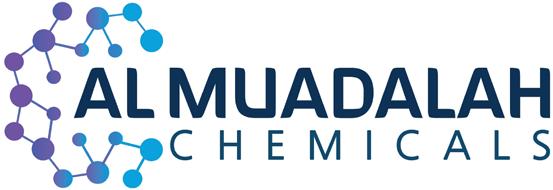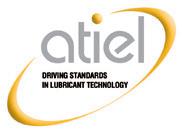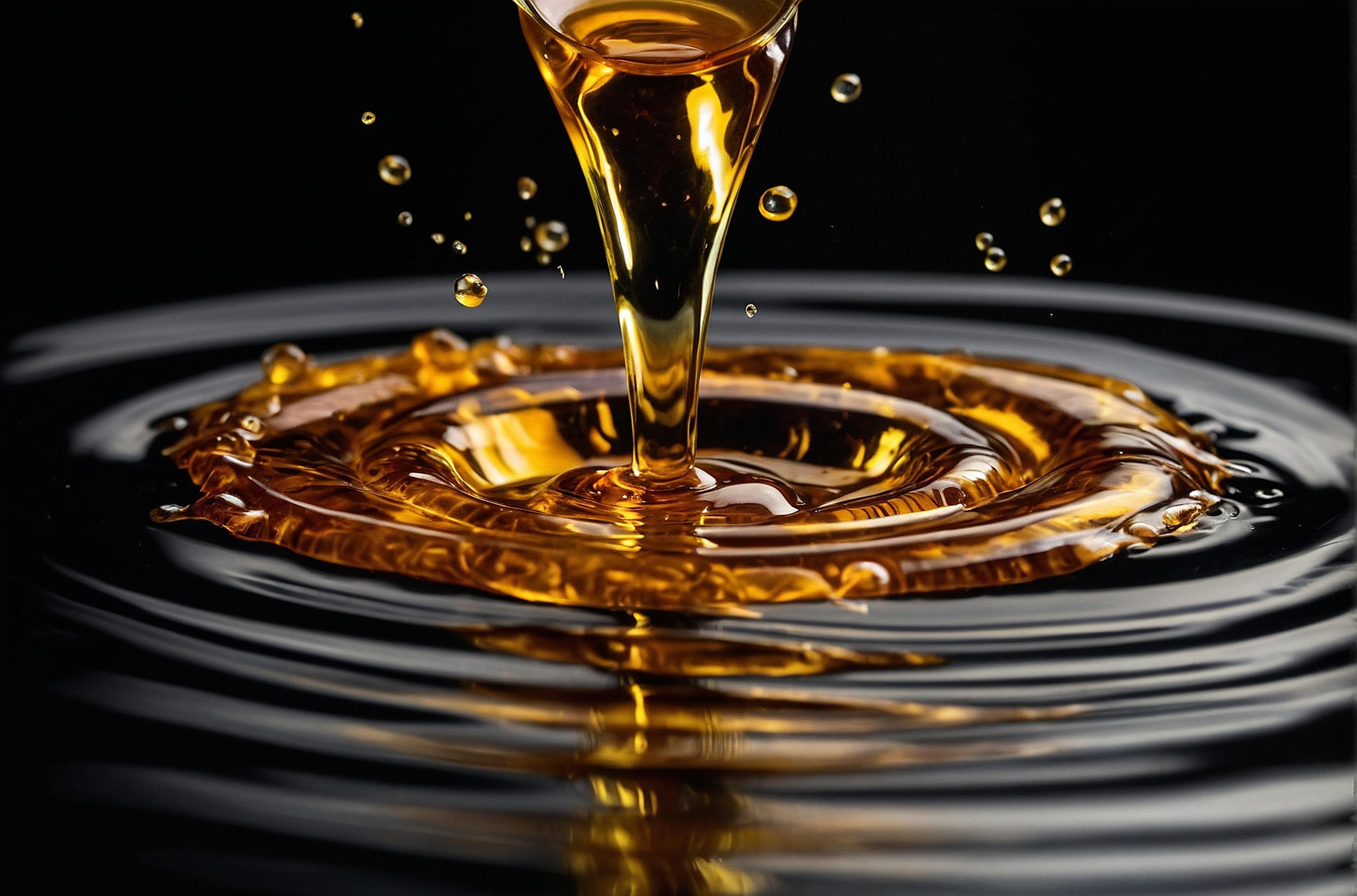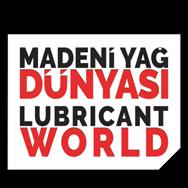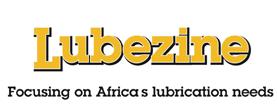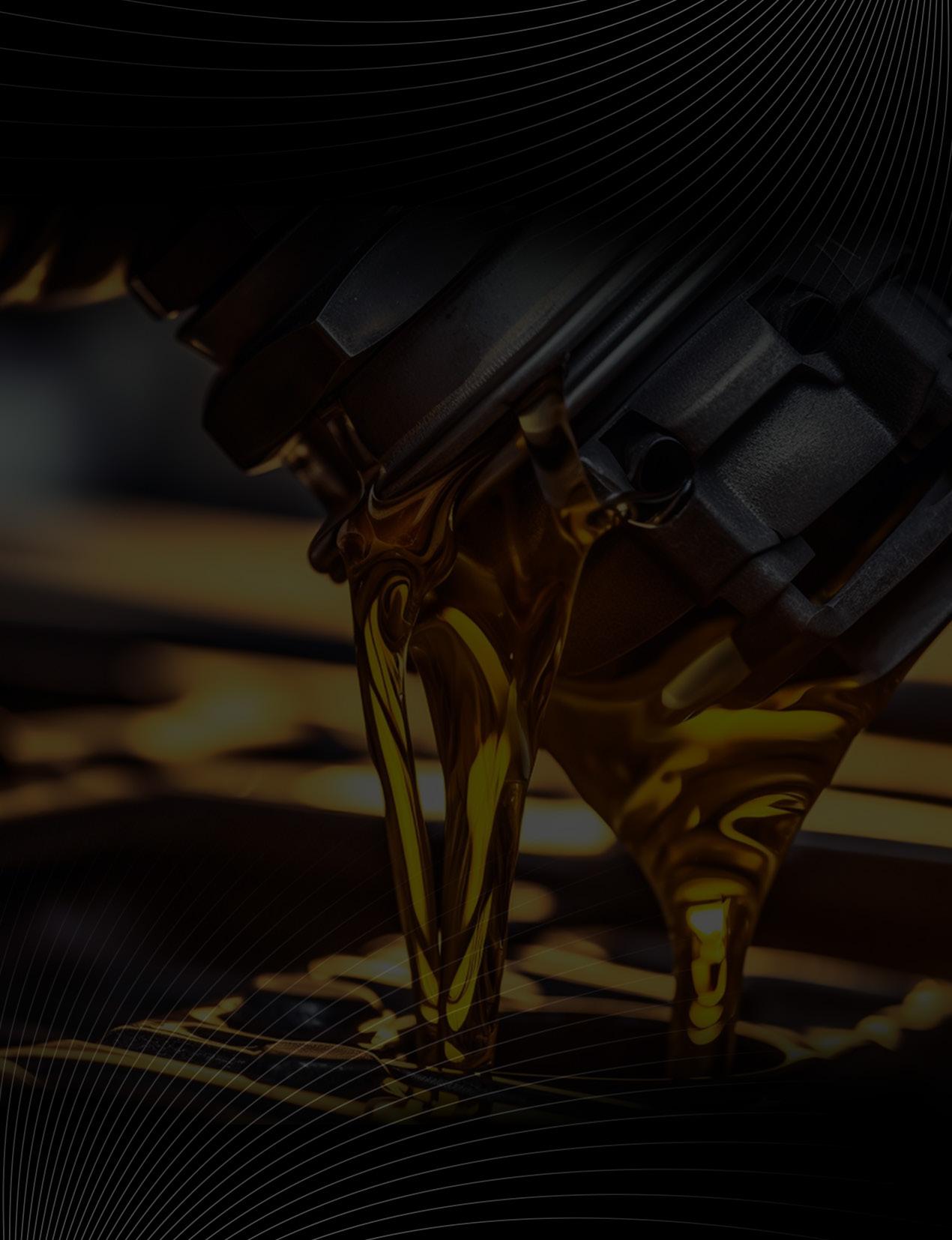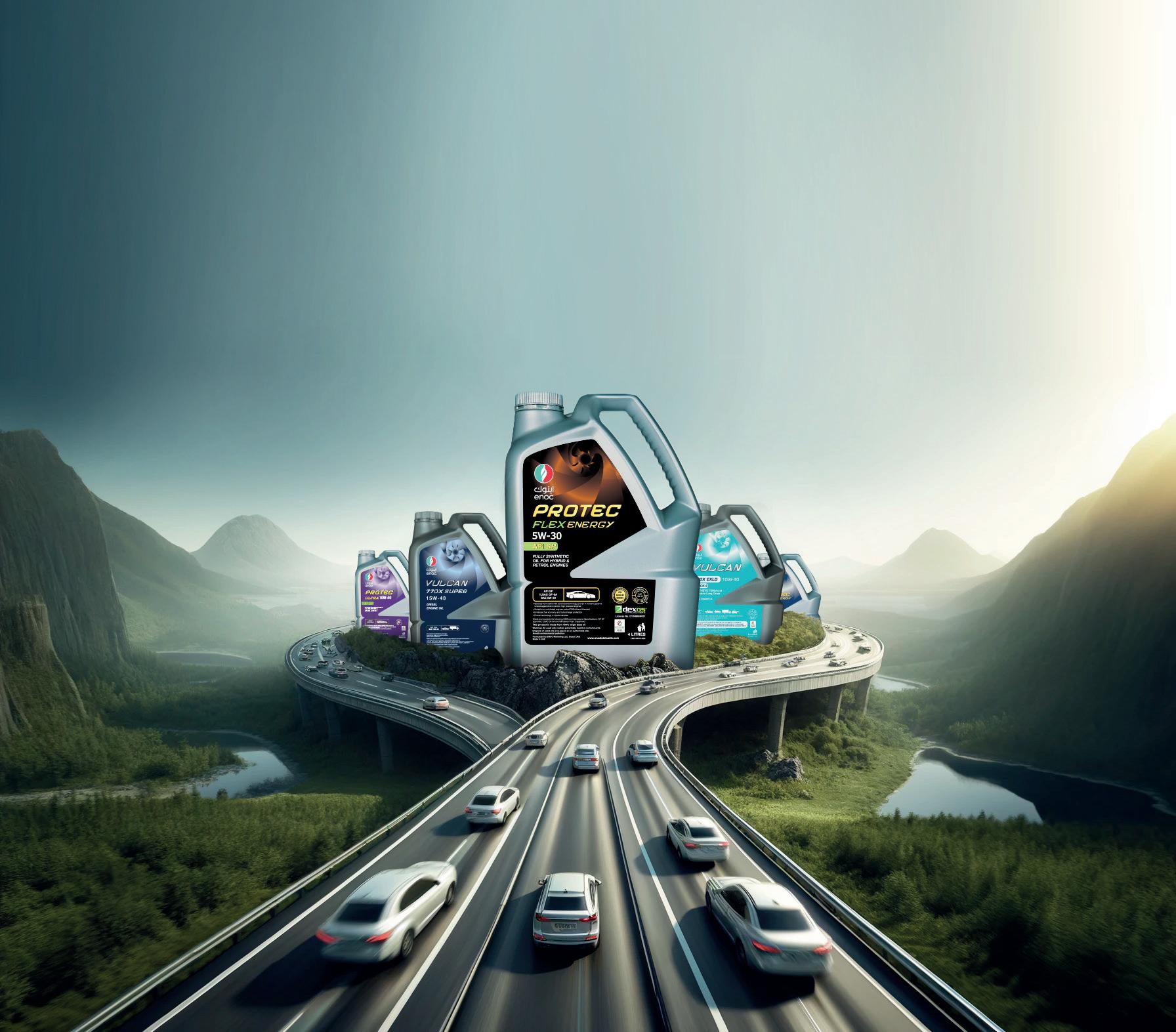










IMCD offers the best fuel and lubricant additives, base oils and speciality chemicals from first class producers. Through technical expertise and valueadded service, including laboratory support, we help to grow your business.
We offer:
• Mineral & synthetic base oils
• Automotive & industrial lubricant additive components and packages
• Fuel compounds, additive components and packages
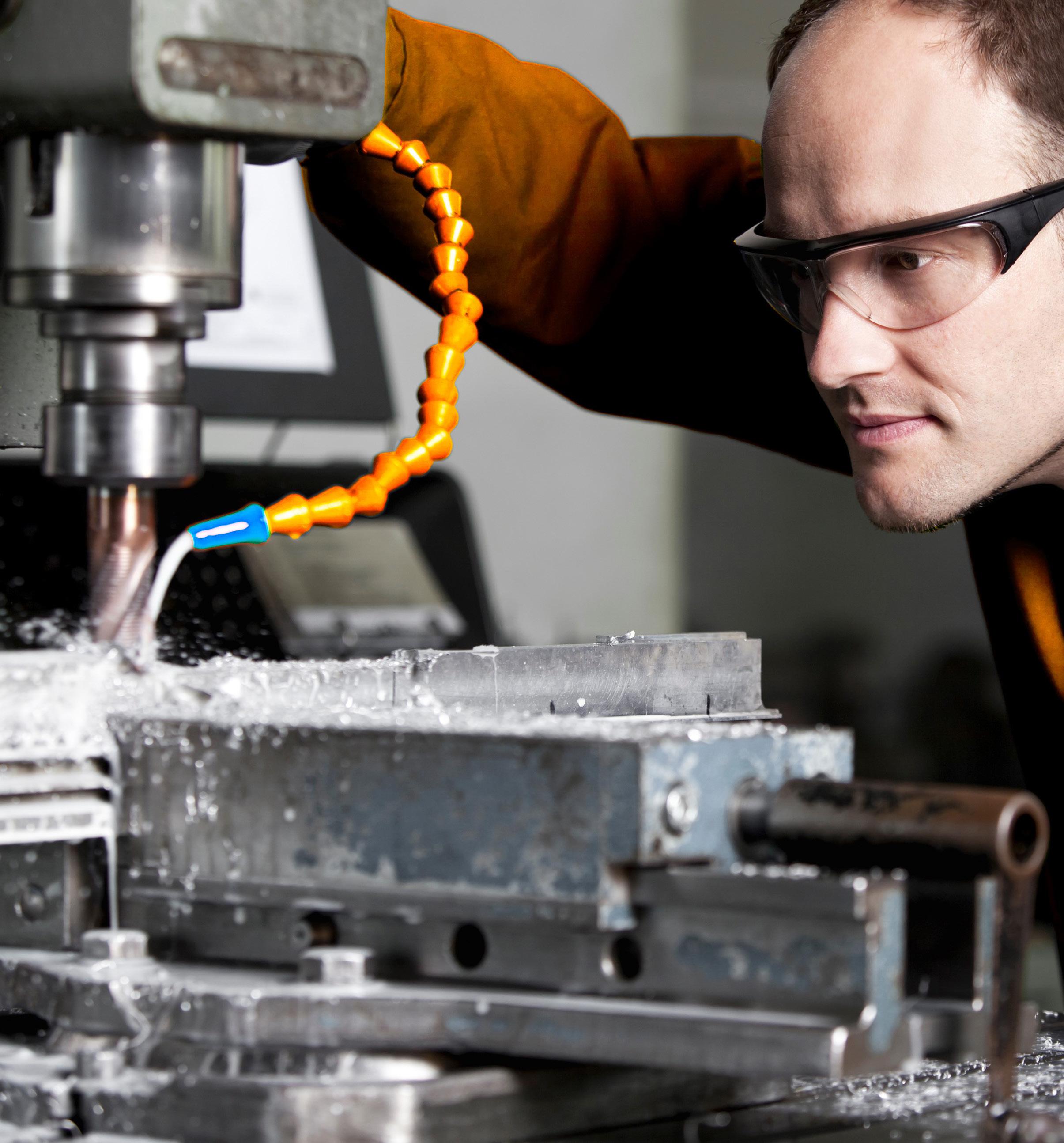
Contact us for more information on how we can support you today.
IMCD Kenya
T. +254 707 765559
E. joseph.juma@imcd.co.ke
The Market Report
Vivo Energy acquisition of Engen now complete
Etu Energias launches lubricants in Angola
Valvoline Global holds an official launch event in Egypt
FUCHS expands its scope in Africa through a name change
Vivo Energy Ghana launches a new engine oil
What’s New: Products and Innovations
Rymax Lubricants upgrades its product label
Castrol launches used oil re-refining program
Lubrizol launches a new heavy-duty additive
PETRONAS produces co-branded lubricants with FPT Industrial
Liqui Moly launches a new oil for engines used in Stellantis Group vehicles
Shell launches upgraded motor oils
In Other Worlds
Infineum and Tata Motors Group receive recognition for a co-developed engine oil
Arteco commissions a coolant plant in China
TotalEnergies Canada and Kubota renew a lubricant partnership
EPPCO Lubricants and SKF to offer RecondOil oil cleaning technology
FUCHS SE and Mercedes-Benz AG collaborate in the automotive after-sales lubricants
Chevron Oronite announces expansion of manufacturing in China
Castrol celebrates its 125th year anniversary
Shell Lubricants and Ducati extend global lubricants collaboration
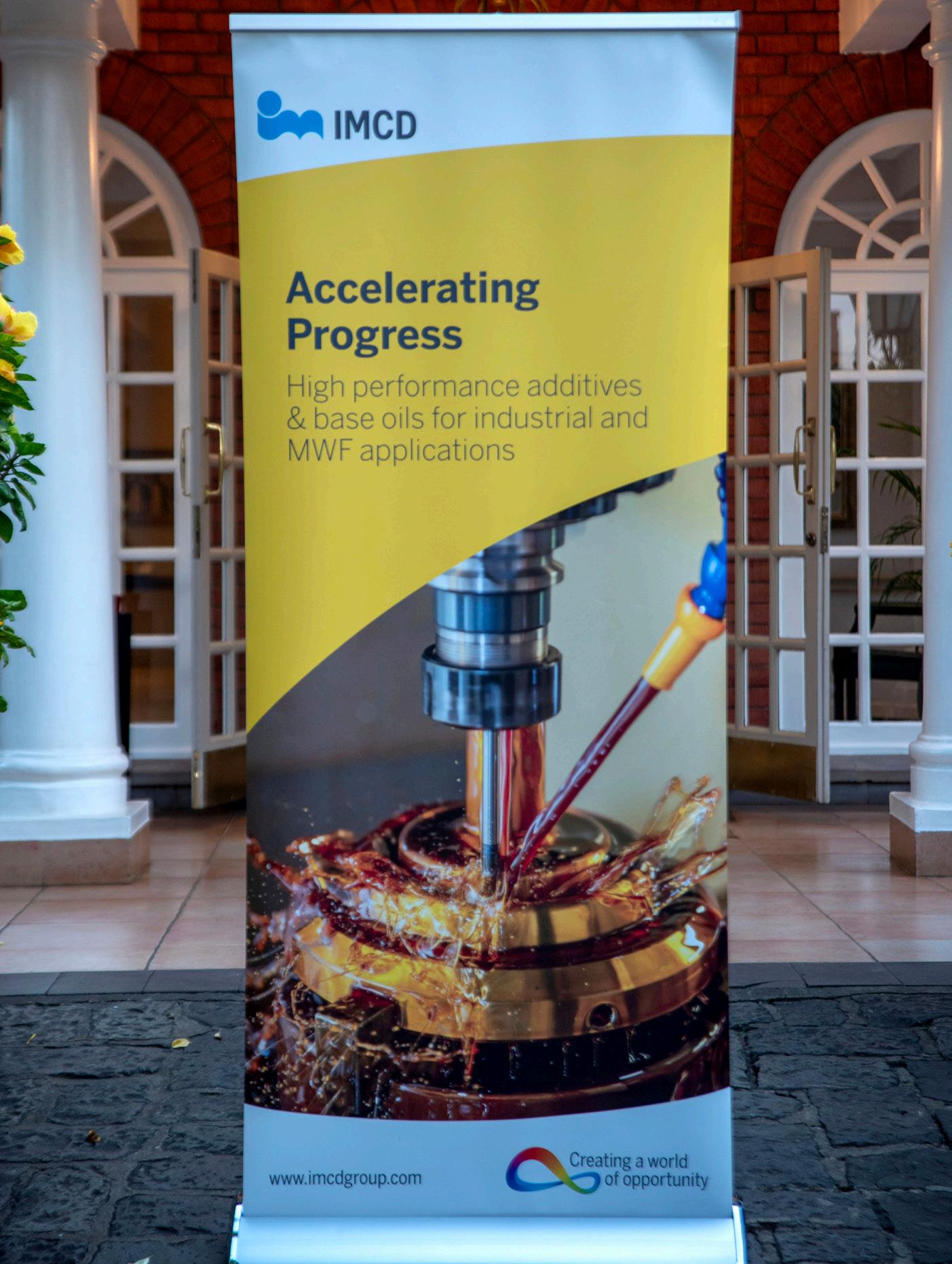
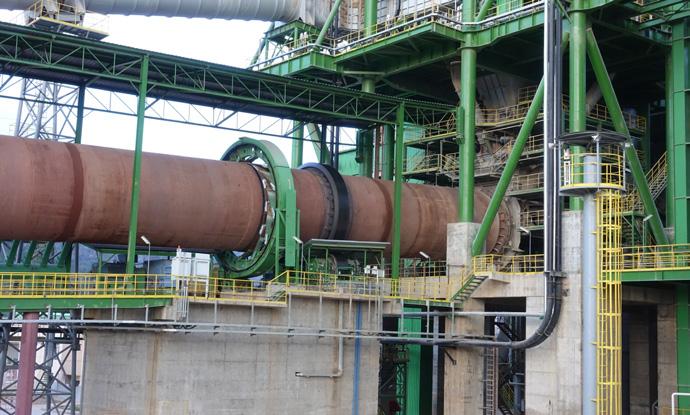
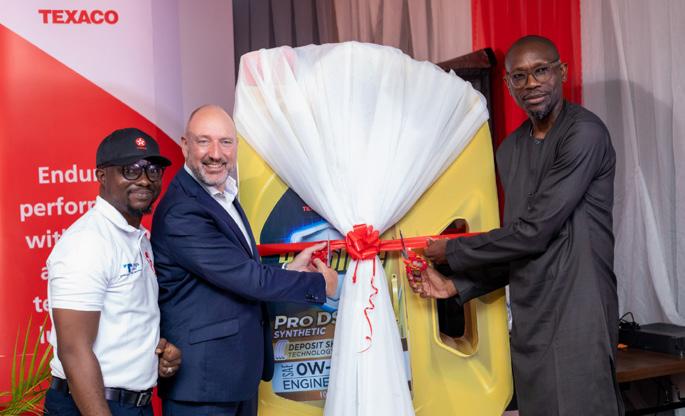
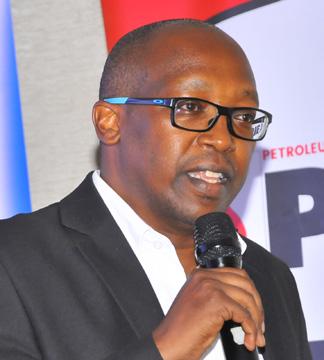
Welcome to the 49th edition of Lubezine. We bring you updates that have been happening in the second quarter of 2024 in the lubricants industry in the African continent and globally.
The African continent has been abuzz with activities by lubricants and additives companies aiming to strengthen their presence. Given its great potential and projected growth rate, Africa is a very attractive market for companies looking to grow their business and widen their footprint.
IMCD Kenya, a distributor of Lubrizol additives in East Africa, held a lubricants and energy conference in Nairobi, Kenya. The event aimed at bringing cutting-edge Lubrizol additives technology closer home, highlighting the importance of using high-quality lubricants and creating awareness on the role additives play in manufacturing these lubricants. Lubrizol also discussed the product range available for the East African market.

Publisher: Lubes Africa Ltd
Editor-in-Chief: Dr. James Wakiru
Design & Layout: MK Pixies creativepixieske@ gmail.com
Further north, in Egypt, Valvoline Global, part of Aramco, also conducted an official launch event for its entry into the market. Ready Parts Egypt, a manufacturer and distributor of motor vehicle parts, distributes Valvoline lubricants. Still, in Africa, German lubricant manufacturer FUCHS Group is expanding its scope in Africa through a name change. At the same time, Vivo Energy has finalized the acquisition of Engen to form Africa’s second-largest oil marketing company. All these activities are a testament to the potential for growth that lies in Africa’s lubricants market, and it is exciting to see all the developments happening.
Nigeria is one of the largest lubricant markets in Africa. To gain insight into the market, we feature a company, Tethys Limited, a brand licensee of Texaco lubricants. Through Tethys, we understand what it takes to produce and market an international lubricant brand locally. We also interview Mr. Ajay Pandey in the professional interview segment. He is a seasoned lubricant professional with
Contributors:
James Wakiru
Miriam Wangari
Mohammed Baraka
Ajay Pandey
Mosil Lubricants ENOC
Photography: Media Agencies Lubezine Library
30 years of experience, 15 of which he spent in Nigeria. Mr. Pandey talks about Nigeria’s lubes market, its opportunities, challenges, and the changes it has witnessed over the years.
To wrap up this edition, we look at Kenya’s lubes market challenges. While the African continent has immense growth potential, challenges must be addressed. Written by one of Kenya’s most seasoned lubricant professionals, Mr. Mohammed Baraka, the Managing Director of Synergy Lubricants in Kenya, this article looks at some of the major obstacles that are affecting the industry. Mr. Baraka talks about counterfeits and regulations that need to be looked into to help the lubricant industry grow even further.
The above is just a glimpse of the information we have gathered concerning the lubricant industry in this edition. We are thrilled to witness its growth, especially in Africa, and we will always bring you updates as they unfold. .
Enjoy the read.
Advertising & Subscription: AFRICA
Miriam Wangari miriam.wangari@lubesafrica.com info@lubesafrica.com
EUROPE, MIDDLE EAST, ASIA
David Jeffries djeffries@onlymedia.co.uk
Only Media Ltd, United House 39-41 North Road, London N7 9DP, UK info@lubesafrica.com www.lubezine.com
Engen and Vivo Energy have announced the completion of the transaction to combine their respective businesses, with PETRONAS selling its 74% shareholding in Engen to Vivo Energy. The combined Vivo Energy Group now has over 3,900 service stations, and more than two billion litres of storage capacity across 28 African markets.
The Phembani Group, Engen’s long-standing Broad Based Black Economic Empowerment (B-BBEE) shareholder is continuing its association with Engen and will remain invested as a 21% shareholder in the South African business. A new 5% employee share ownership programme is being created, resulting in Engen South Africa being 26% owned by historically disadvantaged persons.
In a joint statement, Stan Mittelman, CEO of the Vivo

Energy Group, and Seelan Naidoo, Managing Director and CEO of Engen, said: “We are delighted to conclude the transaction, and will now work together to take the ‘best of both’ from Engen and Vivo Energy, positioning the combined organisation well for growth and success in the years to come.”
Mittelman and Naidoo added: “As part of the transaction, Vivo Energy has committed to invest a significant amount of capital expenditure
to maintain and grow Engen’s operations in South Africa, ensuring a modern and efficient business, for the benefit of the South African population. We have also committed to major investments in renewable solar power generation projects to help transform the economy, while supporting a just energy transition for the country.”
Chris Bake, Chairman of Vivo Energy, concluded: “I would like to thank PETRONAS for its stewardship of
Engen over the last 25+ years. Together with the Phembani Group, they have grown Engen into a valuable corporate citizen. The combination of Vivo Energy and Engen to create a Pan-African champion not only benefits customers in South Africa and across the continent, but also sets up the new Group to achieve its vision to be Africa’s leading and most respected energy business.”
The Vivo Energy Group operates and markets its products in countries across North, West, East and Southern Africa. The newly extended Group has a network of over 3,900 service stations in 28 markets operating under the Engen and Shell brands and exports lubricants to a number of other African countries. Its retail offering includes fuels, lubricants, card services, convenience stores, restaurants, and other non-fuel services. .
TOTALENERGIES
Renewing a lubricant partnership with Kubota Canada P.6
RYMAX LUBRICANTS
Upgrading its product labels P.9
INFINEUM
Receiving recognition for a co-developed engine oil with Tata Motors P.13
FUCHS
Expanding its scope in Africa through a name change P.8
Collaborating with Mercedes-Benz AG in the automotive after-sales lubricants P.17
CHEVRON ORONITE
Announcing expansion of manufacturing in China P.17
VALVOLINE
Holding an official launch event in Egypt with its distributor Ready Parts Egypt P.4
CASTROL
Celebrating its 125th year anniversary and unveils a new strategy P.18
Launching an oil rerefining program P.10
SHELL
Extending global lubricants collaboration with Ducati P.18
Launching upgraded motor oils P.12
VIVO ENERGY
Launching a new engine oil in Ghana P.8
Finalizing on the acquisition of Engen P.3
ARTECO
Commissioning the coolant plant in China P.13
ETU ENERGIAS
Launching lubricants in Angola P.4
EPPCO LUBRICANTS
Partnering with SKF to offer RecondOil oil cleaning technology in UAE P.16
LUBRIZOL
Launching a new heavy-duty additive P.10
PETRONAS
Producing co-branded lubricant with FPT Industrial P.11
LIQUI MOLY
Launching a new engine oil P.12
Etu Energias an Angolan private oil company has launched a line of lubricants. Etu Energias partnered with Glide Technology Sdn Bhd Malaysia to produce these lubricants that will cater to the needs of the different market segments in Angola. The line of lubricants has seven products for passenger vehicles, commercial vehicles, construction equipment, marine vessels, industrial machinery, energy production units, mining operations and special applications.
“Designed to redefine performance and reliability in the lubricants market, the new line of lubricants not only provides exceptional performance but is also designed with sustainability in mind. It
promotes fuel consumption efficiency, reduces emissions and minimizes environmental impact, ensuring a greener and more sustainable future for everyone,” said Etu Energias.
While launching the new line of lubricants, Etu Energias also signed a memorandum with Glide Technology to construct a lubricant blending plant in Angola and ensure a continued supply of the Etu Energias lubricant brand in the country. The plant is expected to have a monthly capacity of 1,000 tonnes, and the investment to construct it is estimated to be five million US dollars, with construction plans set to begin in 2025.
The company highlighted that the launch of these lubricants is the beginning

of its ambition to expand the downstream sector. Through the production of lubricants locally, Etu Energias hopes to meet the local lubricant demand.
ETU Energias main activities are in the areas of import, export, storage, distribution,
Valvoline Global recently held an official launch event in Egypt. Organized by Valvoline’s Middle East and Africa (MEA) team and their distributor in Egypt, Ready Parts Egypt, the event brought together officials from Valvoline Global, Ready Parts Egypt, and the customers.
During the launch, Valvoline presented its product portfolio and the different market segments it covers in Egypt. It also talked about its future growth plans. Valvoline Global commented on this official launch event: “The event set a platform for our journey towards driving growth, delivering value, and shaping the future of automotive
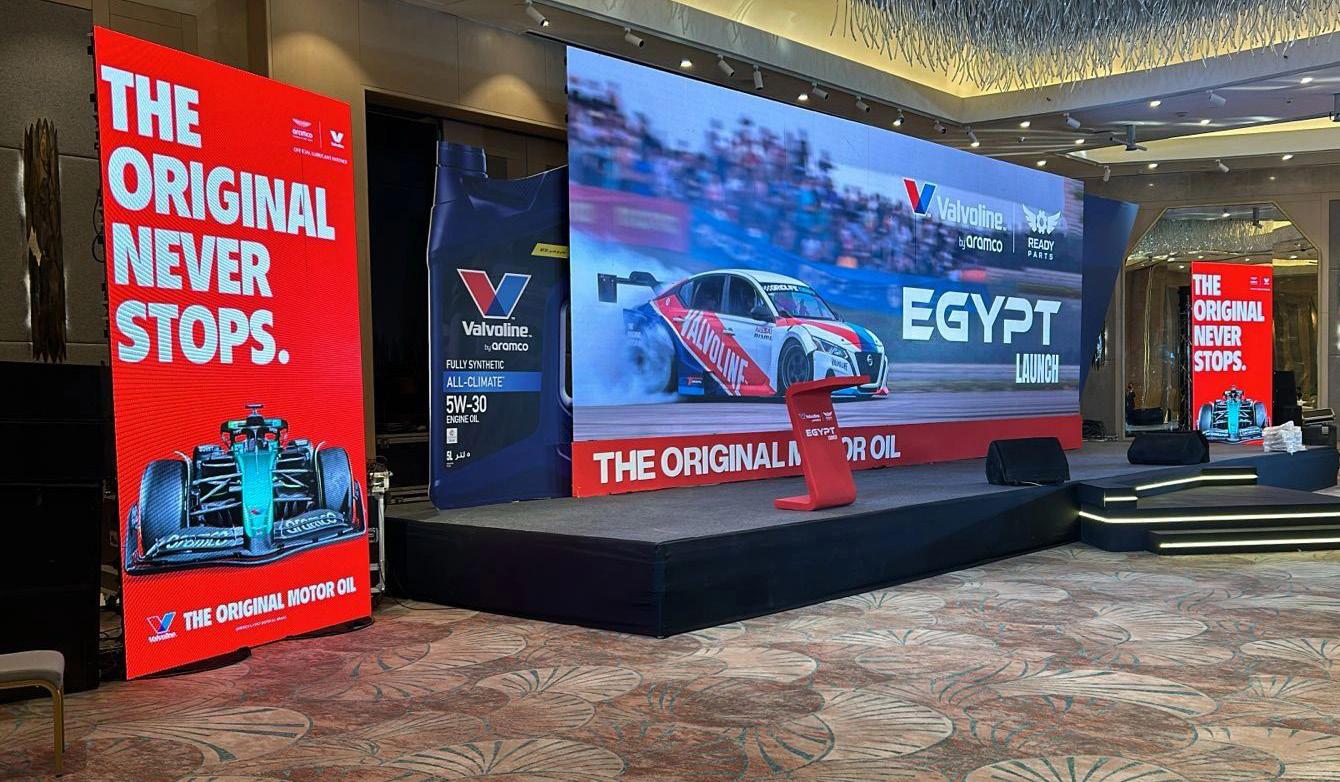
lubricants in the Egyptian market.”
The event also provided a platform for conversations with customers, as well as awarding some of the key customers. Valvoline products are being distributed in Egypt by Ready Parts Egypt, a leading
company in assembling, manufacturing and distributing cars and tires in Egypt and the Middle East and North Africa region. Ready Parts was established in 2016 as a subsidiary of GB Auto Group, and it provides after-sales services to all segments of
marketing, and transport of petroleum derivative products, lubricants, and cooking gas, as well as the logistics activities of loading, distribution, and marketing of petroleum-derivative products to vessels. .
the independent automotive market, such as European, Asian, and American-made passenger cars and commercial vehicles, as well as construction and off-road equipment.
In 2023, Valvoline was separated into Valvoline™ Global Operations and Valvoline Retail Services (Valvoline Instant Oil Change), and the two started operating as individual businesses. Valvoline Retail Services maintained the NYSE ticker VVV, becoming a pure-play automotive retail service provider. Aramco, an integrated energy and chemicals company, acquired Valvoline Global to invest further and grow the business worldwide.

on Bitumen, Base Oil, Hydrocarbon Petrochemicals & Oil Products Best Netowrking experience with Best Players

August 21st & 22nd, 2024 NAIROBI, KENYA
Radisson Blu Hotel, Upper Hill





August 21 - 22
Solvex international event on bitumen base oils, petrochemicals & oil products
Nairobi Kenya https://solvexconference.com/
September 10 - 12
Base Oils Lubricants & Additives Technology Show
Dubai, UAE
https://bolatme.com/
September 17 - 19
Lubricant Expo Europe
Messe Düsseldorf, Germany
https://lubricantexpo.com/

October 8 - 9
ICIS 19th Middle Eastern Base Oils and Lubricants Conference
Riyadh, Saudi Arabia
https://events.icis.com/website/8329/
October 9 - 11
Argus Base Oils Conference Asia
Middle East & Africa Dubai, UAE
https://www.argusmedia.com/en/events/ conferences/base-oils-conference-amea
October 16 - 18
UEIL Congress 2024 Porto, Portugal
https://www.ueil.org/?post_ type=events&p=7347
October 22 - 25
2024 STLE Tribology & Lubrication for E-Mobility Conference Detroit, Michigan (USA) https://www.stle.org/Emobility
November 7 - 8
ICIS 9th African Base Oils and Lubricants Conference
Cape Town, South Africa
https://events.icis.com/ website/13968/
Why do we need specialty lubes in the cement industry?
Cement production involves components like bearings and gears of rotary kilns, mills, roller presses, crushers, etc. The wrong choice of lubricants or the use of general-purpose lubricants may lead to premature failure of components or breakdown, resulting in loss of production and increased maintenance costs. Hence, specialty lubricants are necessary in the cement industry to optimize the efficiency and life of components and avoid unscheduled maintenance. If working conditions are studied thoroughly and then a suitable lubrication product is selected, it may improve the operating efficiency of equipment, enhance component life, and reduce downtime significantly.
Why is it necessary to clean the assembly before applying lubricant?
Various reasons warrant cleaning of equipment before application of lubricant or relubrication. However, the primary reasons may be as follows:
First, if the new lubricant is incompatible with the previous one, it may harm the equipment. Thus, it is important to remove all traces of the previous lubricant by completely cleaning it. Secondly, cement plants invariably operate in highdust areas, and cleaning the assembly removes dust and other contamination from the system before they start damaging the equipment.
How can sludge formation be controlled in gearboxes of the cement industry?
Sludge formation occurs in oxygen, water/moisture, and heat. Properly sealing the gearbox to avoid contamination with water and oxygen can prevent this. Excessive high operating temperatures can weaken the bonds between oil molecules, resulting
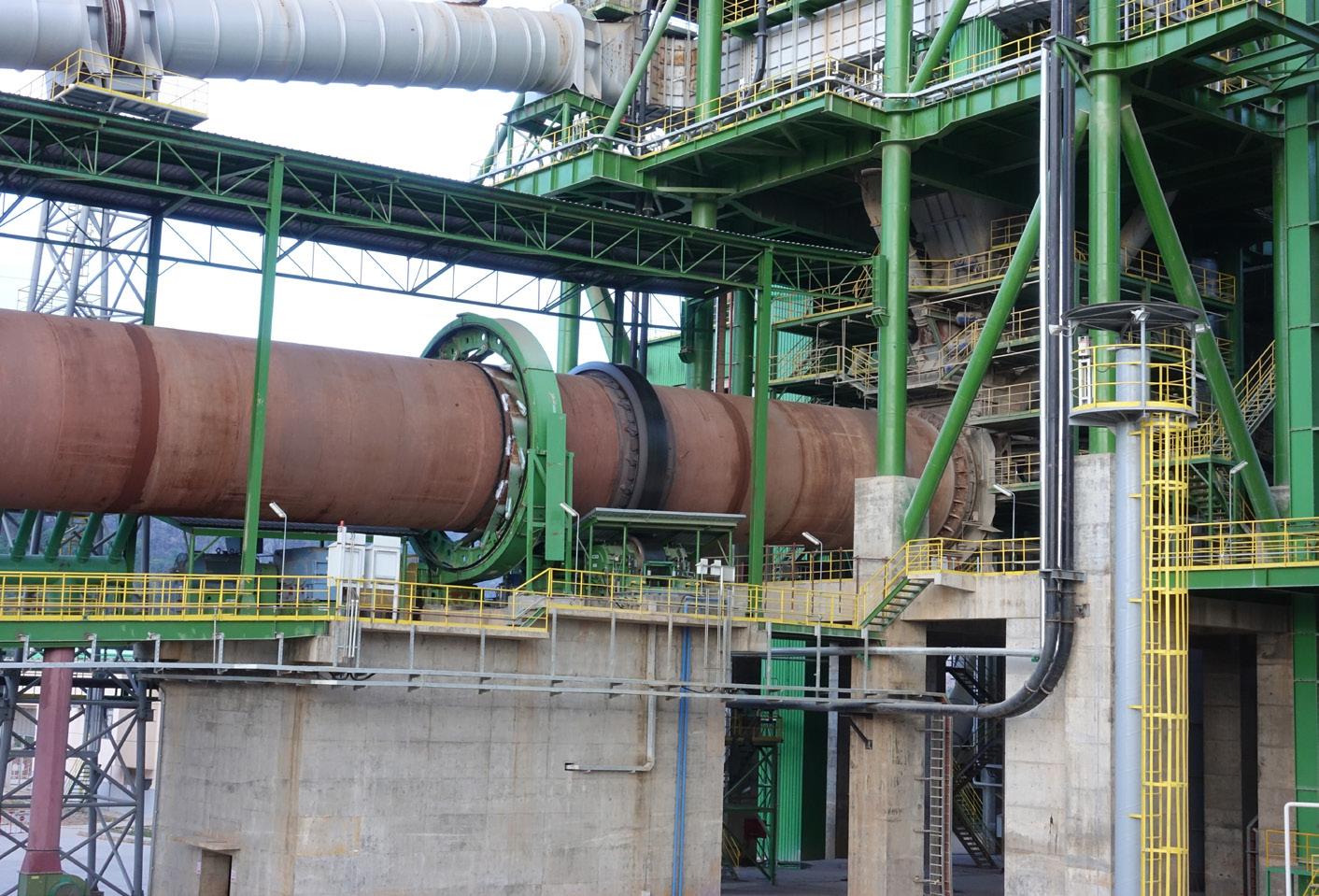
in foaming and carbon residue, leading to sludge formation. Managing the high temperature through proper lubrication may help control sludge formation.
How can vibration be controlled using proper lubricant?
Primary causes of vibrations are imbalance, misalignment, wear, loose connection, etc.
If the vibration is caused by wear, effective lubrication can minimize it. For other reasons, appropriate tools should be considered to ensure perfect alignment of all assembly components.
What is the benefit of using lubricant analysis in case of critical applications in cement plants?
Lubricant analysis monitors samples for mechanical, operational, and environmental factors that affect equipment and lubricant life.
The used lubricant analysis can offer information that ensures the following benefits are reaped:
• Less lubricant to purchase.
• Fewer machine parts to be kept in inventory.
• Less used lubricant requiring disposal.
• Less labour cost.
• Less Downtime.
• Less probability of unexpected failure.
How do environmental conditions affect lubrication?
Humidity, excessive heat, and a dirty or dusty atmosphere can adversely affect the lubricant’s performance. Excessive heat can weaken the bonds of a lubricant. Dirt and dust can contaminate the lubricant, resulting in more friction, which leads to a high operating temperature, that hampers the life of the component and can cause unexpected maintenance breakdowns. .
Mosil Lubricants provided these FAQs: Established in 1971, Mosil is an Indian-origin company specializing in specialty lubricants. With over 40 years of expertise, Mosil is renowned for its commitment to excellence, introducing groundbreaking solutions and synthetic lubricants based on rigorous research and development. Embracing a visionary approach, Mosil has become a trusted name in the lubrication industry, solving maintenance challenges and contributing to the efficiency of diverse applications worldwide. To explore our cutting-edge lubricants, visit www.mosil. com or contact us at enquiry@mosil.com
FUCHS SOUTHERN AFRICA has been renamed to FUCHS AFRICA effective from 1st April 2024 to reflect FUCHS’ business activities in SubSaharan Africa and move away from the perception that FUCHS just serves Southern Africa.
The South African business activities will still be carried out by FUCHS LUBRICANTS SOUTH AFRICA.
Paul Deppe, the Managing Director of FUCHS
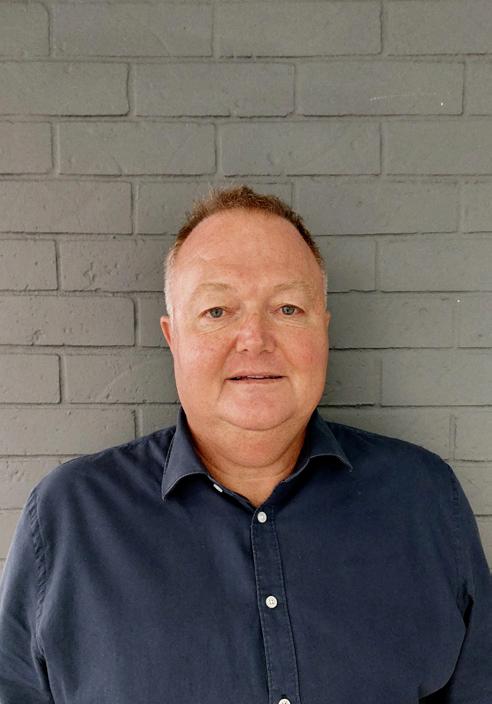
FUCHS Lubricants South Africa
Managing Director, Paul Deppe.
SOURCE | FUCHS LUBRICANTS SOUTH AFRICA
LUBRICANTS SOUTH AFRICA, underscored the importance of the name change as this will encompass the current African business activities and future investments.
“Changing the company’s name to reflect all African businesses is important.
FUCHS AFRICA is far more relevant in describing the footprint for which we take business ownership and responsibility. FUCHS AFRICA will be responsible for growing the FUCHS business in all
Vivo Energy Ghana, the exclusive marketer and distributor of Shell branded products and services, has launched its latest top-tier engine oil, the Shell Helix Ultra 0W-20 SP lubricant, on the Ghanaian market.
The Shell Helix Ultra 0W-20 SP, available at all Shell service stations, offers protection and performance for modern engines due to its formulation and synthetic base oils. It has low viscosity, which ensures smooth engine operation, reduces friction, and enhances fuel efficiency, while its superior wear protection prolongs engine life.
Speaking at the launch, the Lubricants Sales and Marketing Manager, Kwame Mireku Asante, highlighted Vivo Energy’s efforts and dedication to developing solutions that meet the evolving needs of consumers and the
automotive industry. “With the launch of Shell Helix Ultra 0W-20 SP, we are setting new standards in automotive lubrication technology. This unconventional product is designed to deliver unparalleled engine performance and efficiency, providing motorists with a driving experience like never before,” he said.
The Chief Director of the Ministry of Transport, Mrs Mabel Sagoe, who was the Special Guest, commended Vivo Energy Ghana for its commitment to technological advancement and environmental responsibility.
“As the world moves towards reducing carbon emissions and combating climate change, we see lubricants and other petroleum products playing a crucial role in achieving these carbon-neutral objectives. Good lubricants can contribute to reducing greenhouse gas emissions by enhancing
37 countries in Sub-Saharan Africa,” said Paul Deppe.
FUCHS SE has been present in Africa since FUCHS LUBRICANTS SOUTH AFRICA was established.
Across South Africa, a team of more than 200 employees helps clients in agriculture and forestry, automotive, cement, construction, mining, power generation, and the food industry, among other industries. .
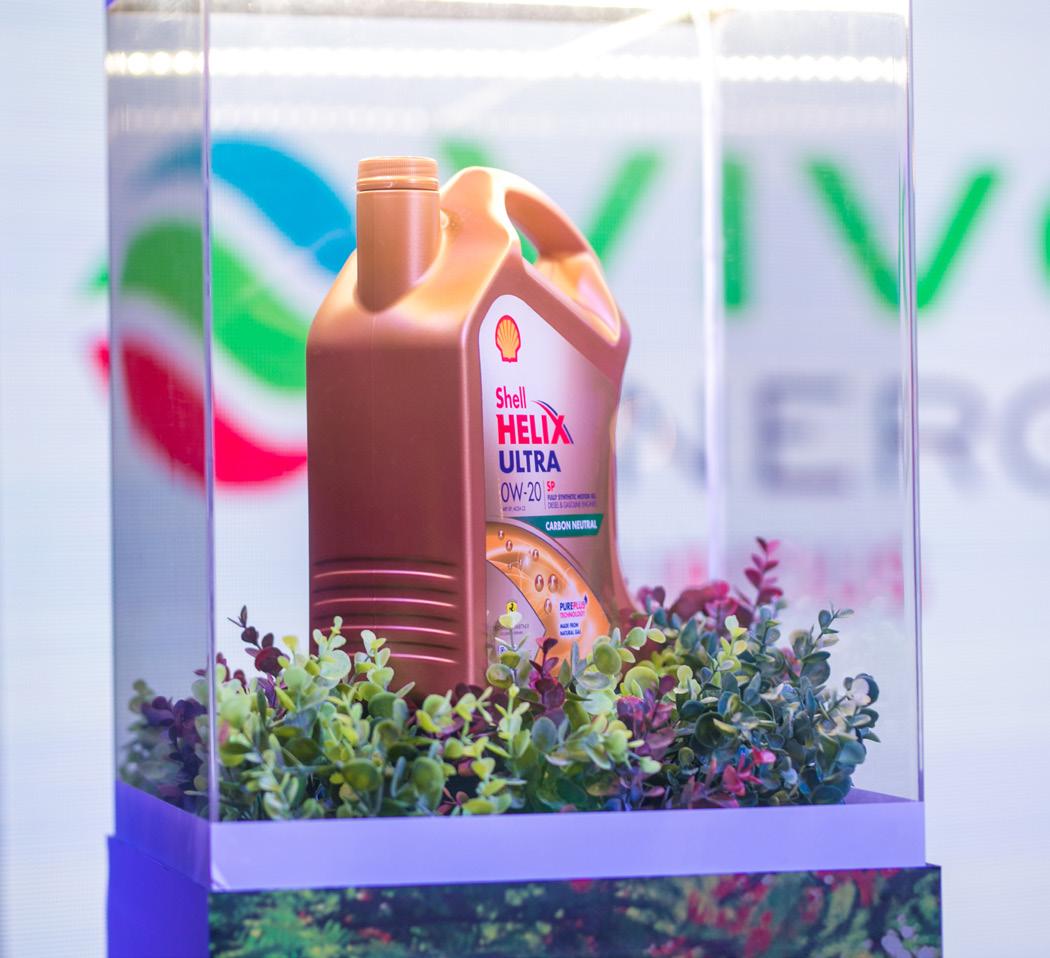
SOURCE | VIVO ENERGY GHANA
fuel efficiency, as mentioned earlier. By minimizing internal friction and optimizing engine performance, they help vehicles burn fuel more efficiently, resulting in lower carbon dioxide emissions. Using environmentally friendly lubricants has become essential,” she said.
Mrs. Sagoe further encouraged the Vivo Energy Ghana team to educate the motoring populace and the nation on how the new Shell Helix 0W-20 supports the nation’s drive toward carbon neutrality and protects the environment. .
Rymax Lubricants has upgraded its product labels as a response to feedback and a recurring concern from its customers about the durability and appearance of the labels.
Rymax Lubricants exports its products to 55 countries worldwide, in all kinds of places and climates.
Rymax Lubricants has been working with Geostick and Global Sticker to upgrade the labels. Rymax says it has already received positive feedback across Asia, with customers noting, “With its unique orange color and modern labels, the new look of Rymax products not only shows top quality but also makes them stand out on our display stand compared to other brands.”
Rymax Lubricants said, “Recognizing the importance of addressing
this issue, we were proactive to start upgrading all aspects of our product with a big focus on our labels. Our partnership with Geostick, our trusted label supplier, proved instrumental. Together, we explored new materials, adhesives, and manufacturing processes to improve durability and visual appeal in label production. The journey to improve our label quality to match the high-quality lubricant inside has paid off. The labels on our bottles are now more resilient than ever, capable of withstanding various environmental conditions without compromising aesthetics. The days of peeling and weathered labels are gone – our products now show quality and professionalism from the moment they hit the shelves.” .
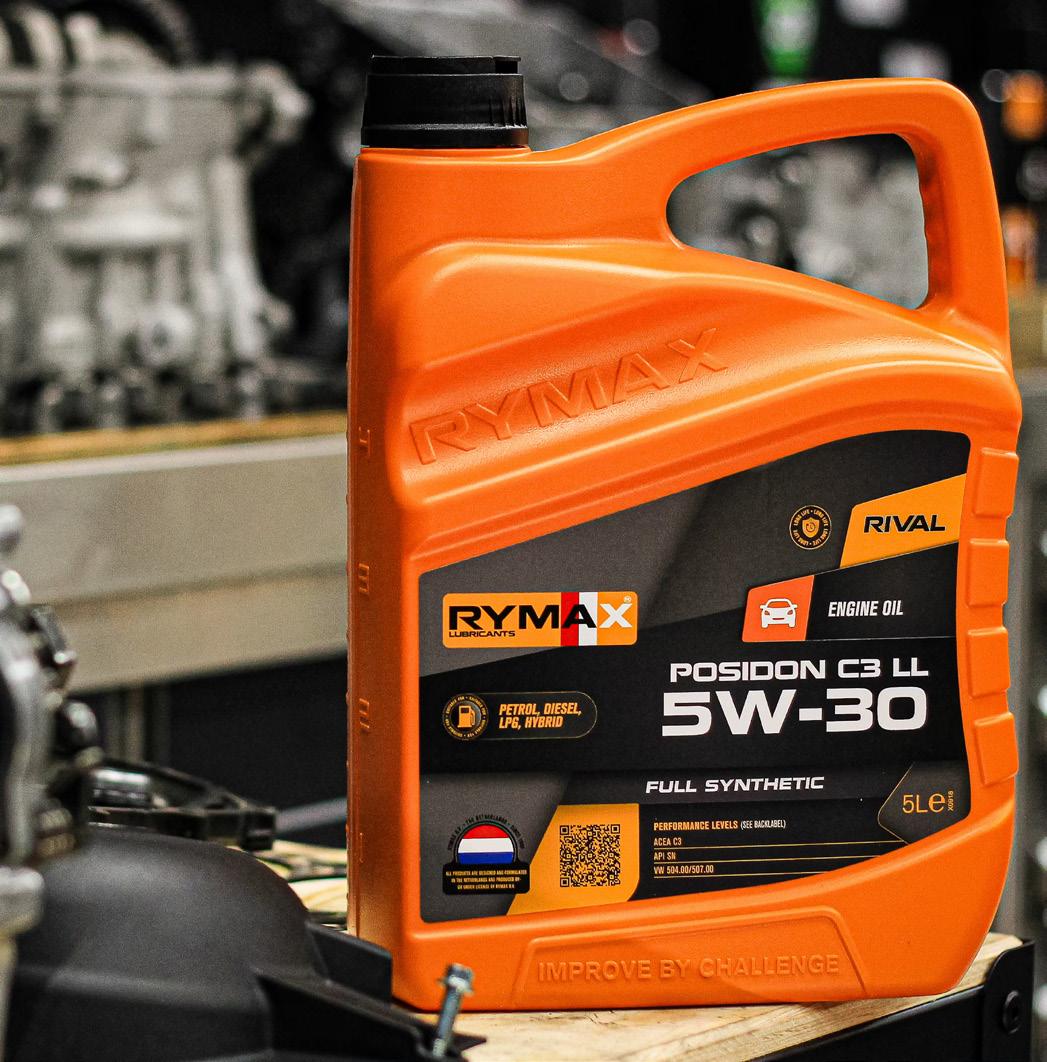
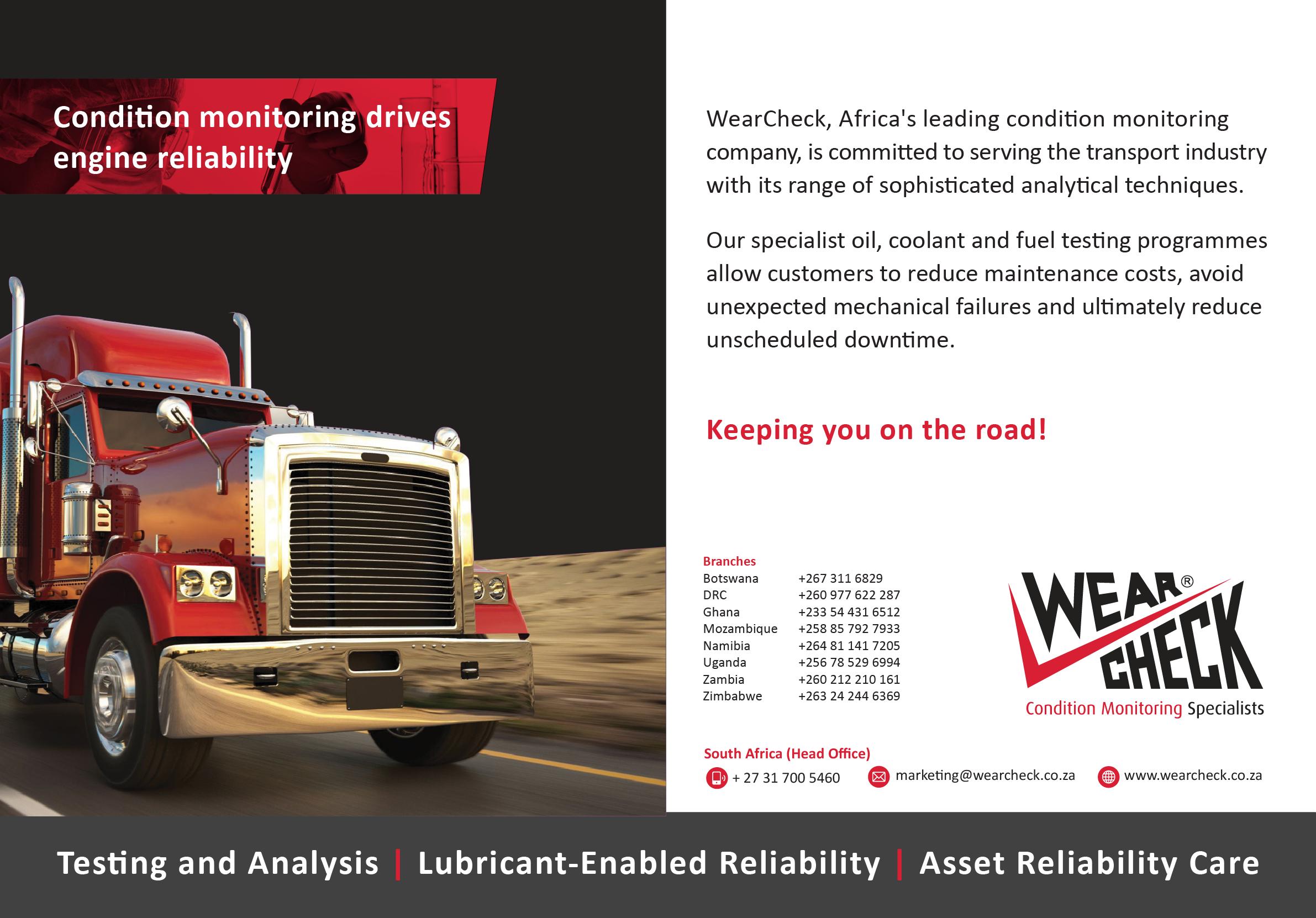
Castrol has launched Castrol MoreCircular, which is designed to reduce the carbon footprint of business lubricants in the United States (US). ‘Castrol MoreCircular’ encompasses the entire process of collecting used oil from business customers, re-refining it and integrating re-refined base oil into premium lubricants for supply to businesses.
‘Castrol MoreCircular’ has been created in collaboration with Safety-Kleen, an environmental services subsidiary of Clean Harbors Inc. Following successful market trials, Safety-Kleen and Castrol signed a multi-year collaboration agreement. The ‘Castrol MoreCircular’ Program will officially launch on May 20, 2024, at the Advanced Clean Transportation Expo in Las Vegas, Nevada.
The end-to-end offer begins with collecting used lubricants from ‘Castrol MoreCircular’ customers such as fleet maintenance shops and industrial sites.

The used oil is then re-processed, enabling around 70% of it to be recovered as base oil. Re-refined base oil is combined with Castrol’s cutting-edge technology to blend premium lubricants, resulting in an estimated 20-40% lower carbon footprint than Castrol’s traditional products. Re-refined base oil makes up at least 65% of the base oil in each MoreCircular lubricant; the reduction in the carbon footprint depends partly on the
percentage of RRBO used.
“Our ability to collect used oil from across the country and reprocess a waste product means that much of it can be used repeatedly. Delivering these lower-carbon-footprint lubricants can help our business customers meet their sustainability goals with the same high-quality and high-performance they expect from Castrol,” said Andreas Osbar, CEO of Castrol Americas. “We
believe the time is right to lead the market with an integrated, more circular approach to lower carbon footprint, as our business customers are searching for levers to help de-carbonize their operations. This is a first-of-its-kind, nationwide offer in the US, and we’re excited to partner with Safety-Kleen to deliver it.”
“Safety-Kleen is proud to partner with Castrol, a recognized industry leader, to help bring increased circularity to the United States lubricants industry,” said Brian Weber, President of SafetyKleen Sustainability Solutions, a segment of Clean Harbors, Inc. “We are North America’s largest collector of used oil with more than 200 branch locations that safely and compliantly collect more than 250 million gallons annually. Our operations span every major metropolitan area in the U.S., and we can meet the waste oil collection needs of any customer of Castrol’s ‘MoreCircular’ offering”. .
FORMULATION
Lubrizol, a leader in additive technology for the transportation industry, has launched Lubrizol® CV9660, a new low-SAPS Heavy-Duty lubricant additive.
Lubrizol® CV9660 has been formulated to address the growing demands for ACEA E8 lubricants in the European market. The new additive has base oil flexibility, meaning it can be used with different groups of base oils. It also uses Lubrizol® 7077, a widely available performance polymer. The additive is also notable for covering multiple viscosity grades in heavy-duty space to meet

various needs, boost efficiency, and deliver added value.
“Low-SAPS, Heavy Duty lubricants pose a challenge to our customers,” said Alex Brewster, Lubrizol Heavy Duty Product Manager, Europe. “Viscosity grades, base oils, and additive packages all create complexity
within the oil marketers’ operations and within the product range itself. In addressing this challenge, we are pleased to have developed a solution with exponential benefits.”
Lubrizol® CV9660 joins a suite of products supporting the diverse needs of the heavy-duty market and bolsters Lubrizol’s reputation
in the industry as a total solutions provider. This product is launched as the European lubricant market upgrades to higher-performance lubricants to meet the demands of the existing Euro VI legislation and enable cleaner powertrain technology. .
PETRONAS Lubricants
International (PLI) and FPT Industrial have unveiled a co-branded range of fluids engineered for marine, on-road, off-road, and power-generating engines and vehicles. FPT Industrial is an Iveco Group brand dedicated to designing, producing, and selling powertrains and solutions for on- and off-road vehicles and marine and power generation applications.
The marine range caters to boats, yachts, and cruise ships, while the on- and off-road vehicles include trucks, heavy machinery, and power generators. The oils have features such as temperature control across seasons, reduced friction,

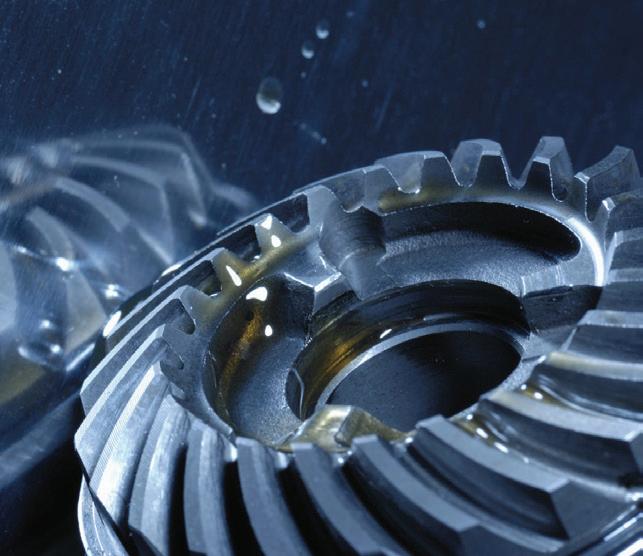
and comprehensive cleaning and protection.
“We are proud to introduce the PLI-FPT Industrial co-branded product range, a testament to our unwavering commitment to innovation and providing tangible solutions for all applications,” stated Giuseppe Pedretti, EMEA Regional Managing Director at PETRONAS Lubricants International. “Our collaboration with FPT Industrial represents our commitment to providing high quality, tangible solutions, and we are confident that our latest range of products will meet these applications.”
“FPT Industrial engine technology has made great strides in recent


years, with a particular focus on sustainability and efficiency,” said Sergio Carpentiere, Vice President of Customer Service & Digital at FPT Industrial. “With this new launch in collaboration with PETRONAS
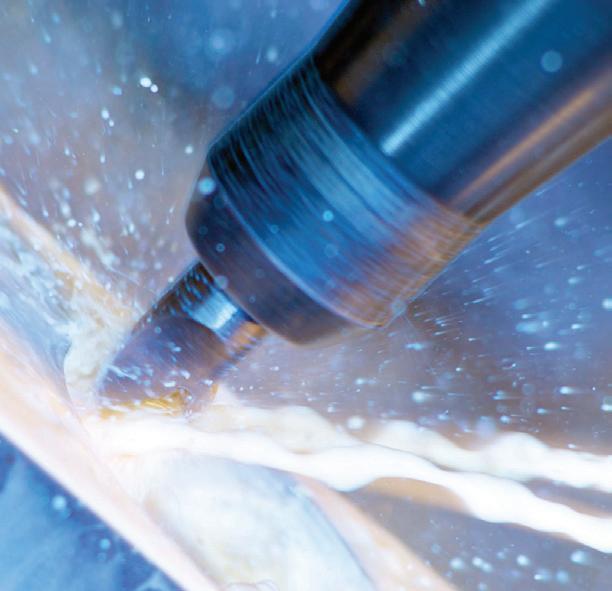
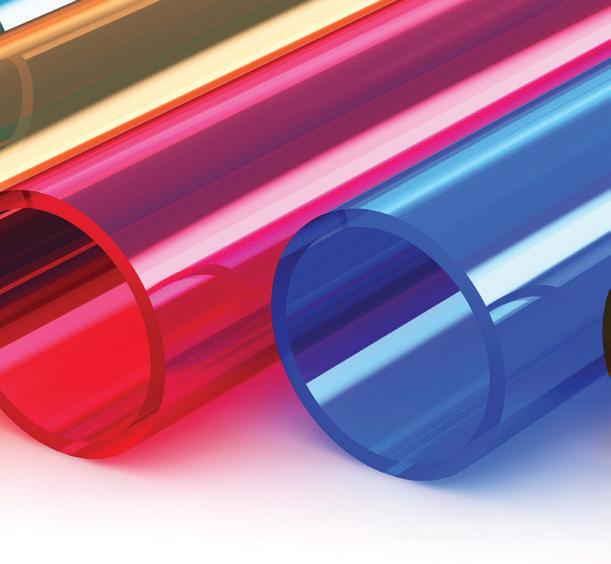
Lubricants International, we want to provide our customers the right tool to maintain this exceptional performance over time and guarantee a full, complete product offering for the engine life.”. .


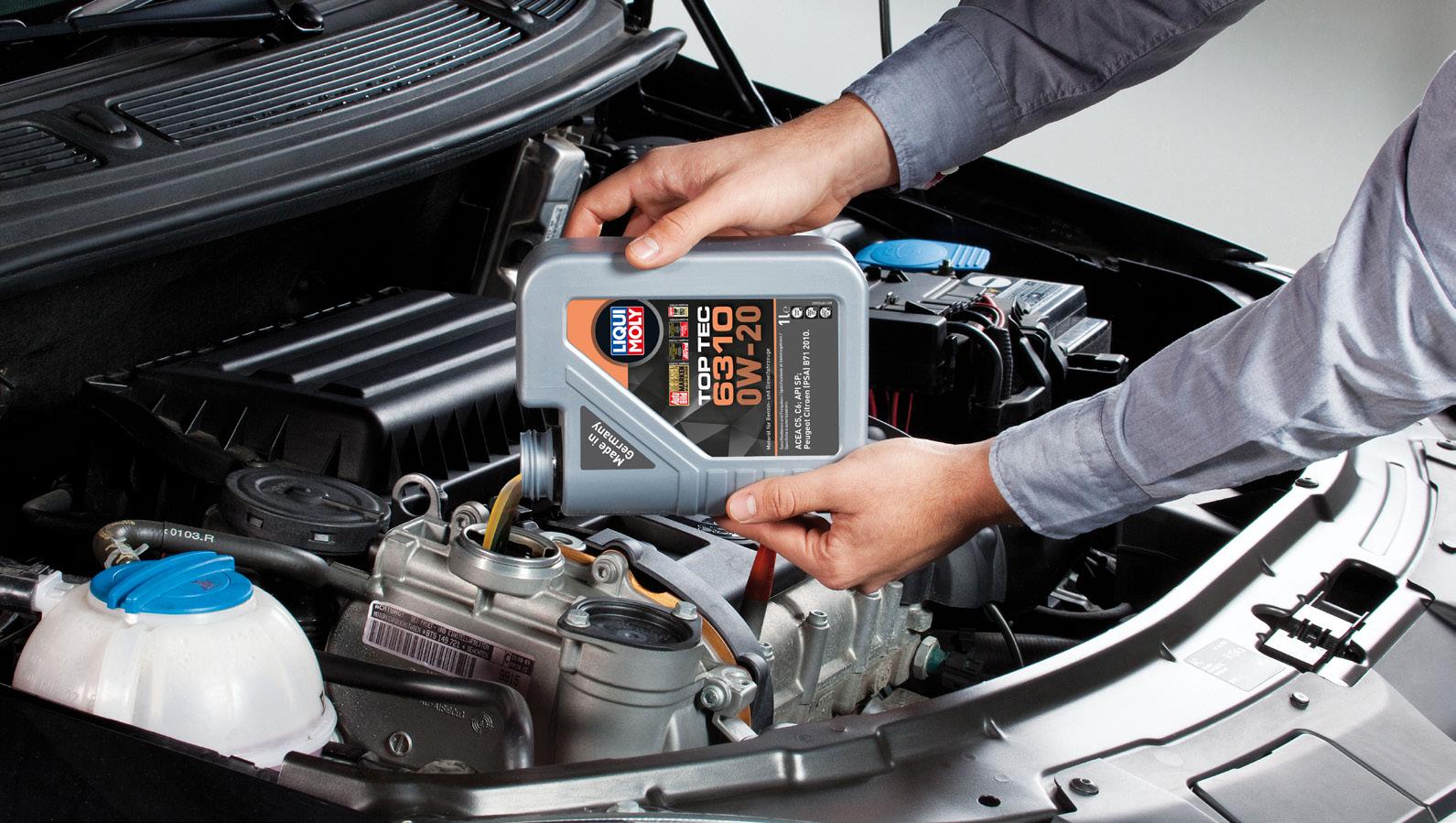
LIQUI MOLY is launching a new motor oil, Top Tec 6310 0W-20, on the market that meets the requirements of the PSA Group (PSA B71 2010), among others. Top Tec 6310 0W-20 is primarily intended for petrol, petrol/hybrid,
and diesel engines from the model year 2018 for Citroën, DS, Fiat, Jeep, Opel, Peugeot, and Vauxhall vehicles. This oil can be used in PSA engine types that require a lubricant with the approval PSA B71 2010. Various brands of the
Shell Lubricants has launched three new products under its Shell Helix Ultra passenger car motor oil brand to meet upgraded industry specifications and Original Automotive Manufacturer (OEM) requirements.
Shell Helix Ultra ECT C6 0W-20 and Shell Helix Ultra ECT C3/SP 0W-40 will be launched in China and Europe in the second and third quarters of 2024, respectively, before being rolled out in other markets. Shell Helix Ultra ECT C3/SP 0W-30 is already available in China and will be launched in Europe in the third quarter, ahead
of a rollout in other markets.
Jason Wong, Global Executive Vice President of Shell Lubricants, said: “Shell Helix motor oil is the number one global brand in the passenger car lubricants market, and we have now raised the bar even further by launching three new Shell Helix Ultra products. The new products meet upgraded industry specifications and OEM requirements, reflecting our ongoing commitment to innovation and technology leadership. They enable customers to unleash more engine power and achieve better fuel efficiency, offering them
Stellantis Group use these engines. This low-viscosity lubricant helps small engines in this series achieve good performance with low wear. The new product balances maximum fuel savings with an extremely thin but durable
lubricant film.
“This is a top-of-the-line oil that reduces fuel consumption and offers the engine comprehensive protection,” said Oliver Kuhn, deputy head of the LIQUI MOLY oil laboratory. “Due to its thin film, the new lubricant makes the engine need less power to pump it.”
Top Tec 6310 0W-20 engine oil has the following advantages:
• Saves fuel and reduces pollutant emissions.
• Optimum stability to aging.
• Optimum oil pressure under all operating conditions.
• Smooth engine running.
• Long engine service life.
• High lubrication reliability.
• High shear stability.
• Good wear protection.
• Outstanding engine cleanliness.
• Good high and low temperature behavior.
The new lubricant is available in 1L, 5L, 20L, 60L and 210L. .
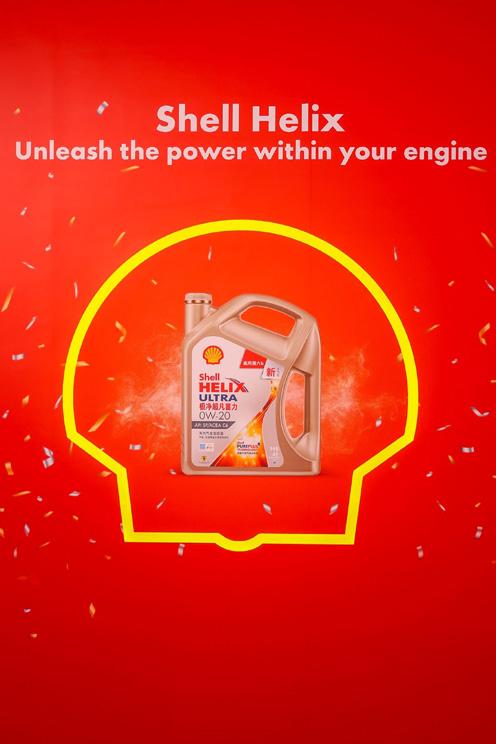
ultimate engine performance.”
Shell highlighted that test results show that the new Shell Helix Ultra products enable customers to increase engine power by up to 1.8%, increase the responsiveness of their engine by up to 3.4%, and achieve better fuel efficiency of up to 4%. The field trials also demonstrate that the new products enable customers to keep their engines as strong and powerful as new engines, running up to 200,000km, whatever the driving conditions. .
By Miriam Wangari
Infineum and Tata Motors Group have been recognized for leading the Indian lubricant market in developing the first heavy-duty engine lubricant designed to reduce vehicle emissions and improve air quality. At the recent SIAT 2024 conference, Tata was awarded ‘Best Indian Paper on Environmental Pollution’ for a joint paper with Infineum titled “Development of Low Viscosity Fuel Economy Engine Oil for Commercial Vehicles.”
Fully commercialized for both factory and service fill, the next-generation ultra-low viscosity (3.0 HTHS) lubricant marks a tremendous leap forward, enabling Tata to achieve significant carbon footprint reductions across its commercial vehicle portfolio.
India’s burgeoning vehicle population makes emissions reduction a top priority, and tackling this challenge was the cornerstone of the joint development between Tata and Infineum. Jamie Musmacher, Infineum Commercial Engines Director, expressed his pride in the team’s accomplishment, stating, “Not only is this merit a fantastic accomplishment and an honour, but it’s also a testament to the team’s effort over the last five years to develop the relationship with Tata, and ultimately deliver a solution worthy of this public recognition.”
S K Raghuram, the Head of Infineum’s India office, added: “What started as a product development effort aimed at top-tier HD performance with Tata created a new category for factory and service fill. We
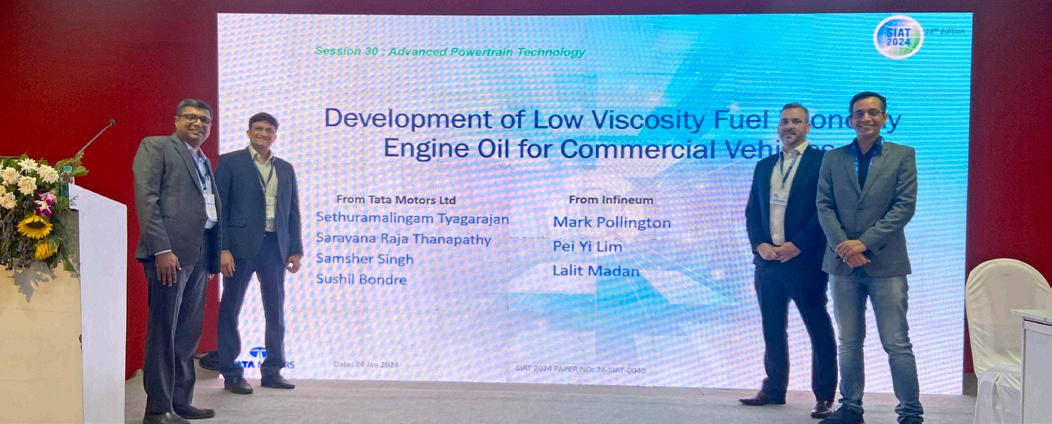
are proud to be part of this ground-breaking initiative that enhances commercial vehicle performance and contributes to environmental sustainability. We look forward to continuing our successful partnership with Tata and driving further innovations in the industry.”
Infineum further said, “Our journey with Tata Motors began in 2018 when they expressed interest in launching a fully synthetic premiumquality fuel economy engine
Arteco NV, a manufacturer of water-based engine coolants and heat transfer fluids, celebrated the inauguration of its new coolant production plant in China.
The plant’s capabilities extend beyond traditional internal combustion engine coolants to produce heat transfer fluids for all New Energy Vehicles (NEV), including electric, hybrid, and hydrogen fuel cell vehicles. The new production plant will cater to local automotive customers and produce heat transfer fluids for the electronics cooling segment, including applications such as data centers.

Mr. Alexandre Moireau, Arteco’s General Manager, added, “This plant is part of Arteco’s global strategy. As a leader in the coolant industry, our primary focus is serving global customers in
different industries and countries, with particular significance in the China market. Strengthening our local presence will amplify our supply chain resilience, optimize operations, and mitigate the risks
oil. Infineum’s team worked closely with Tata throughout the development process, ensuring their requirements and values were at the forefront of our efforts. We saw this as an opportunity to showcase our leading-edge technology to develop a top-tier heavy-duty engine oil that meets Tata’s specific needs while contributing to environmental sustainability and comfortably meeting the requirements of Bharat VI stage II emissions limits.” .
inherent in extensive global supply chains.”
“Since the creation of the Arteco China affiliate in 2010, our teams have been successfully growing the business, winning the trust and support of our customers. With this solid foundation, Arteco is now moving into the next chapter. The new plant will manufacture right from the raw materials instead of imported additive packages, serving the automotive, industrial, and electronics cooling industries,” concluded Mr. Zuoling Zhang, General Manager Shanghai Arteco Coolants Science and Technology Co., Ltd. .
ENOC Lubricant established in 1998 and is pioneer of the latest technology products in the region. ENOC Marketing LLC, ENOC Lubricants and Grease Manufacturing Plant and EPPCO Lubricants is a subsidiary of ENOC Group and holds high standard certifications including ISO9001, ISO 14001, ISO 45001, ISO 50001, OHSAS 18001, as well as prestigious Laboratory standard ISO 17025 accreditation from Emirates Authority for Standardisation and Metrology. The company is also certified for automotive standard IATF 16949.
ENOC Lubricant established in 1998 and is pioneer of the latest technology products in the region. ENOC Marketing LLC, ENOC Lubricants and Grease Manufacturing Plant and EPPCO Lubricants is a subsidiary of ENOC Group and holds high standard certifications including ISO9001, ISO 14001, ISO 45001, ISO 50001, OHSAS 18001, as well as prestigious Laboratory standard ISO 17025 accreditation from Emirates Authority for Standardisation and Metrology. The company is also certified for automotive standard IATF 16949.
Why it is important for a lubricants company to get these
organisations is the ISO 9001 Quality Management System. ISO 9001 is an international standard that specifies requirements for quality management systems (QMS).
organisations is the ISO 9001 Quality Management System. ISO 9001 is an international standard that specifies requirements for quality management systems (QMS).
Why it is important for a lubricants company to get these ISO outputs

International Organization for Standardization (ISO) certification establishes credibility and trust among consumers, clients, and other business partners. In today's international marketplace, such a designation validates that an organisation adheres to global standards of quality assurance, manufacturing, and business. As a global player, it is important for us to be globally recognised by ISO, as it contributes to facilitating our global operations and expansion through providing common standards among different countries. These standards are intended to ensure that our products and services are safe, reliable, and of good quality. In this article, we cover in brief each of the above ISO certification & more importantly what it means to end customer.
International Organization for Standardization (ISO) certification establishes credibility and trust among consumers, clients, and other business partners. In today's international marketplace, such a designation validates that an organisation adheres to global standards of quality assurance, manufacturing, and business. As a global player, it is important for us to be globally recognised by ISO, as it contributes to facilitating our global operations and expansion through providing common standards among different countries. These standards are intended to ensure that our products and services are safe,
Individuals can progress within the QMS landscape by getting the ISO 9001 certification which is a globally recognised credential that demonstrates their expertise in the field. It is given to those who have successfully proved their knowledge, skills, and competence in implementing and maintaining quality management practices based on the ISO 9001 standard. It also shows that an individual deeply understands the standard, its principles, and its application in improving processes, enhancing customer satisfaction, and driving continuous improvement.
Individuals can progress within the QMS landscape by getting the ISO 9001 certification which is a globally recognised credential that demonstrates their expertise in the field. It is given to those who have successfully proved their knowledge, skills, and competence in implementing and maintaining quality management practices based on the ISO 9001 standard. It also shows that an individual deeply understands the standard, its principles, and its application in improving processes, enhancing customer satisfaction, and driving continuous improvement.
Organisations which employ ISO 9001 experts can benefit from ISO 9001 certification in different aspects, such as:
ISO 14001 is suitable for organisations of all types and sizes, be they private, not-for-profit, or governmental. It requires that an organisation considers all environmental issues relevant to its operations, such as air pollution, water and sewage issues, waste management, soil contamination, climate change mitigation and adaptation, and resource use and efficiency. Like all ISO management system standards, ISO 14001 includes the need for continual improvement of an organization’s systems and approach to environmental concerns. The standard has recently been revised, with key improvements such as the increased prominence of environmental management within the organisation’s strategic planning processes, greater input from leadership and a stronger commitment to proactive initiatives that boost environmental performance.
Organisations which employ ISO 9001 experts can benefit from ISO 9001 certification in different aspects, such as:
• Enhanced quality management
• Enhanced quality management
• Increased customer satisfaction
• Increased customer satisfaction
• Improved operational efficiency
• Improved operational efficiency
• Risk management
• Risk management
• Consistency in processes and
• Consistency in processes and
• Evidence-based decision-making
• Evidence-based decision-making
• Supplier and partner relationships
• Supplier and partner relationships
• Continuous improvement
In this article, we cover in brief each of the above ISO certification & more importantly what it means to end
• Continuous improvement
• Regulatory compliance
• Regulatory compliance
ISO 9001: ISO 14001
Organisations worldwide are continually looking for methodologies and strategies to enhance the quality of their products and services. A very well-recognised and structured approach that provides guidance to these
Organisations worldwide are continually looking for methodologies and strategies to enhance the quality of their products and services. A very well-recognised and structured approach that provides guidance to these
ISO 14001 is an internationally agreed standard that sets out the requirements for an environmental management system. It helps organisations improve their environmental performance through more efficient use of resources and reduction of waste, gaining a competitive advantage and the trust of stakeholders.
ISO 14001 is suitable for organisations of all types and sizes, be they private, not-for-profit, or governmental. It requires that an organisation considers all environmental issues relevant to its operations, such as air pollution, water and sewage issues, waste management, soil contamination, climate change mitigation and adaptation, and resource use and efficiency. Like all ISO management system standards, ISO 14001 includes the need for continual improvement of an organization’s systems and approach to environmental concerns. The standard has recently been revised, with key improvements such as the increased prominence of environmental management within the organisation’s strategic planning processes, greater input from leadership and a stronger commitment to proactive initiatives that boost environmental performance.
Key Benefits: Organisations using ISO 14001 have found success across a range of areas, including reduced energy and water consumption, a more systematic approach to legal compliance and an improved overall environmental performance.
Key Benefits: Organisations using ISO 14001 have found success across a range of areas, including reduced energy and water consumption, a more systematic approach to legal compliance and an improved overall environmental performance.
ISO 45001 is a global standard for Occupational Health and Safety Management Systems that provides a practical solution to improve the safety and health of both employees and other personnel.
ISO 45001 is a global standard for Occupational Health and Safety Management Systems that provides a practical solution to improve the safety and health of both employees and other personnel.
ISO 45001 training enables the organisation to improve their occupational health and safety performance in preventing injury and ill-health.
ISO 14001 is an internationally agreed standard that sets out the requirements for an environmental management system. It helps organisations improve their environmental performance through more efficient use of resources and reduction of waste, gaining a competitive advantage and the trust of stakeholders.
ISO 45001 training enables the organisation to improve their occupational health and safety performance in preventing injury and ill-health.
One of most important benefit to end Customer is that the organisations with ISO 45001 will have systems in place to ensure continuous productivity, hence product availability. Implementation of
One of most important benefit to end Customer is that the organisations with ISO 45001 will have systems in place to ensure continuous productivity, hence product availability. Implementation of
ISO 45001 in the organisation paves a way towards fewer workplace injuries and illnesses through a proactive approach to hazard identification and risk assessment which in turn leads to improved organisational health and safety. With ISO 45001 certification, companies demonstrate that they have taken every crucial step to protect the workers by eliminating ineffective practices which helps the employees to deliver more in a stipulated time due to effective systems in place.
ISO 50001 assists facilities in evaluating and prioritizing the implementation of new energy-efficient technologies and in improving energy efficiency, energy use and consumption. These aspects are very critical for high volume manufacturing company like ENOC.
There are many benefits of achieving ISO 50001 certification. ISO 50001:2018 allows businesses to establish a practice around the use of energy that reduces business risk and improves productivity and operations. ISO 50001 provides a framework in order to achieve the energy goals-reducing depletion of energy resources which in return helps mitigate climate change, and also improving the efficiency within the organisation’s operations.
ENOC Lubricants manufacturing plant is supported by world class laboratory infrastructure. The lab operates 24x7 to continuously monitor the quality of lubes produced as well as provide supporting services in new product development. The accuracy & precision of results matter a lot.
ENOC laboratories are certified against international ISO 17025 certification. ISO/IEC 17025 enables laboratories to demonstrate that they operate competently and generate valid results, thereby promoting confidence in their work
both nationally and around the world.
It also helps facilitate cooperation between laboratories and other bodies by generating wider acceptance of results between countries. Test reports and certificates can be accepted from one country to another without the need for further testing, which, in turn, improves international trade.
Accurate results is the cornerstone of maintaining lubricants quality standards. Each & every drop of ENOC products are rigorously tested. Compliance to ISO 17025 ensures Customer is guaranteed of the results of quality tests used to certify these lubricants.
IATF
IATF 16949:2016 is the global technical specification and quality management standard for the automotive industry. The primary goal of this standard is the development of a quality management system that provides for continual improvement, emphasising defect prevention, and the reduction of variation and waste. IATF quality group consisting of manufacturers and trade groups associated with the automotive industry. The purpose of the IATF is to control the quality of products within the automotive industry on behalf of their customers. Some of the key manufacturer members include the BMW Group, FCA Italy S.p.A. (formerly Fiat Group Automobile), Daimler AG, the FCA USA LLC (formerly the Chrysler Group), General Motors Company, Ford Motor Company, PSA Peugeot Citroen, Volkswagen AG and Renault SA. Trade groups involved in the IATF include the AIAG of the United States, ANFIA of Italy, FIEV of France, VDA of Germany and SMMT of the United Kingdom as well as the Japanese OEMs like Toyota, Nissan, Honda.
For any factory fill supplies of parts & components to automotive OEMs globally, the supplier (including
lubricants) are required to meet IATF 16949 standards, else the supplier is not qualified. The IATF standards represent the highest in terms of quality requirements in relation to automotive industry.
ENOC Lubricants division received the prestigious IATF 16949 2016 certifications individually for both its manufacturing plants ELOMP, Fujairah & DLPP, Dubai also covering the EML Head Office in Dubai covering Product Design, Sales & Marketing functions.
ENOC Lubricants units comprising of two plants & HO teams has gone through rigorous 7 step certification process over a period of one and half years comprising of following phases:
1. Executive and Management Overview / Planning
2. Gap Assessment and Planning
3. Documentation
4. Implementation and Training
5. Internal Assessment and
Management Review
6. 3rd Party Registration
Assessment
7. Sustain and Continual
Improvement
ENOC Lubricants with its manufacturing plants are possibly one of the first plants in Middle East & Africa to get IATF 16949 certification. This clearly demonstrates the commitment of ENOC Group in terms of providing very high quality of products & services to its customers.
By garnering various ISO accreditations, ENOC Lubricants strives to provide customers with top quality product manufactured in quality certified plants that not only look at batch to batch adherence to quality, but also manufactures products in environmentally safe manner.
A 360degree approach is required to ensure the journey from Concept to Customers. Higher specification lubricants will require demanding Quality Assurance programmes. ENOC Lubricants is at the forefront implementing these programmes.
TotalEnergies Marketing Canada Inc. has renewed its partnership with Kubota Canada Ltd., a Japanese agricultural equipment manufacturer, for the next two years. This agreement continues a partnership that began in 2018. Under this partnership, TotalEnergies Marketing Canada produces Kubota-branded lubricants and distributes them to its dealer network.
“TotalEnergies has a relationship with Kubota that began in 2013, taking shape today through collaboration in more than 25 countries, and we are therefore proud to contribute to it through the trust placed in the development of its activities

in Canada. We share common values such as quality and innovation, enabling us to develop a constantly evolving range of products and services that meet market needs. Our know-how and R&D in the lubricants sector, where we are the 4th largest player worldwide, have made this close
collaboration possible,” said Olivier Gauthier, President of TotalEnergies Marketing Canada Inc.
Jignesh Patel, Manager of Inventory Management at Kubota Canada, added, “Kubota Canada proudly announces the signing of a two-year contract with
EPPCO Lubricants, the joint venture between ENOC and Chevron, signed an agreement with SKF, a leader in bearing and seal manufacturing, to introduce SKF RecondOil technology to the UAE. EPPCO Lubricants is the sole distributor of SKF RecondOil filters across the UAE.
SKF RecondOil filtration technology is based on a double separation system that cleans the oil in service by removing harmful nano-particles that cause varnish and wear of mechanical components.
Saif Humaid Al Falasi, Group CEO, ENOC, and Chairman of EPPCO Lubricants board, said: “We invest in next-generation and clean technologies through our focus on
acquiring innovative solutions that add to our operational efficiency. Our latest partnership with SKF will offer our growing base of customers access to a revolutionary lubricant filtration technology that is sustainable and will prevent the oil from aging, ensuring optimal performance. We are confident that this strategic partnership will fulfill the current market requirement, providing customers with reliable oil solutions.”
Sandro Chervatin, Director Sales Italy, Iberic, Turkey & Middle East, SKF, said: “RecondOil is a proven innovative technology, a patented double-separation nanoparticle technology for oil filtration that re-uses used oil and
TotalEnergies Marketing Canada to produce and distribute Kubota Oil products throughout Canada. Building upon a longstanding partnership, Kubota Canada and TotalEnergies have collaborated for numerous years. Kubota Canada deeply values this enduring relationship and appreciates TotalEnergies’ consistent delivery of high-quality products and exceptional service.
TotalEnergies Marketing Canada Inc., a subsidiary of TotalEnergies, has been manufacturing and distributing a full range of lubricants for Canada’s automotive, heavy-duty, and industrial vehicle markets since 2007. .

reduces environmental impact. This cutting-edge technology involves a comprehensive understanding of the lubricant industry, precise matching of oil with the filter, and an ongoing oil analysis program to monitor filtration performance.”
SKF is a Swedish bearing and seal manufacturing company
founded in Gothenburg, Sweden, in 1907. The company manufactures and supplies bearings, seals, lubrication and lubrication systems, maintenance products, mechatronics products, power transmission products, condition monitoring systems, and related services globally. .
FUCHS SE and Mercedes-Benz Global Customer Service and Parts announced a strategic business partnership. FUCHS will provide tailor-made lubrication solutions for Mercedes-Benz customers.
Andreas Jörg, Director of Service and Parts Business, Warranty and Goodwill at Mercedes-Benz Group AG said, “Our strategic partnership with FUCHS SE is an exciting opportunity to further enhance our commitment to our customers by collaborating on innovative technologies that will shape the future
of mobility and customer experience.”
“We are thrilled to join forces with Mercedes-Benz Global Customer Service and Parts to push the boundaries of automotive technology,” said Stefan Fuchs, CEO of FUCHS SE. “FUCHS has a long history of working with Mercedes-Benz, most notably as the original partner for the genuine oil program. Together, we will work towards developing lubrication solutions that not only enhance vehicle performance and reliability but also promote environmental stewardship.”
Chevron Oronite has announced its decision to expand its lubricant additive facility in Ningbo, China.
Chevron Oronite first announced its intention to build a manufacturing plant in China in 2015 and selected Ningbo as the preferred location in mid-2018. Construction commenced in late 2018, and the plant was fully commissioned in 2020. Commercial production started in 2021.
“This investment underpins Chevron Oronite’s dedication to providing exceptional reliability and reinforces our commitment to our customers in China,” said Mitra Kashanchi, President of Chevron Chemicals. “This next phase of development in Ningbo will better
position us to help meet the needs of China’s market while maintaining close proximity to customers and critical raw material supply.”
“We are proud of our Chevron Oronite China team for their dedication to the Ningbo facility and continued advancement of their organizational capabilities,” said Keng Yang Lim, General Manager, Manufacturing and Supply Chain, Asia-Pacific Region, Chevron Oronite. “With their learnings from the successful construction, start-up, and operations of the Ningbo plant, I am confident that the project team has a strong foundation to build on for this expansion that will help ensure the project is executed safely and reliably.” .
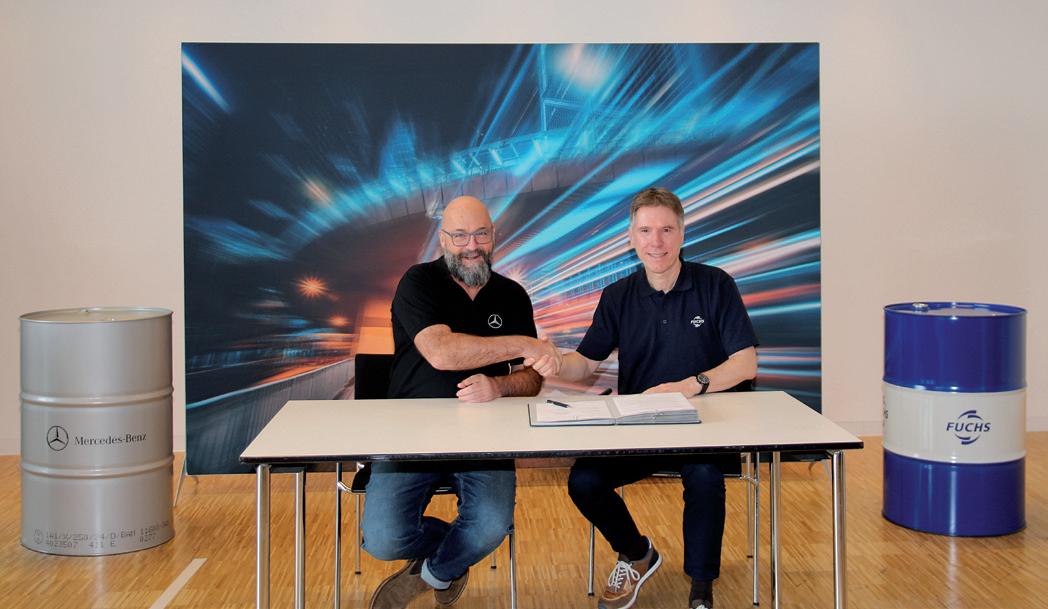
As part of the collaboration, FUCHS and Mercedes-Benz Global Customer Service and Parts will also explore opportunities for joint marketing initiatives and educational programs to raise awareness about the importance of sustainable mobility solutions .
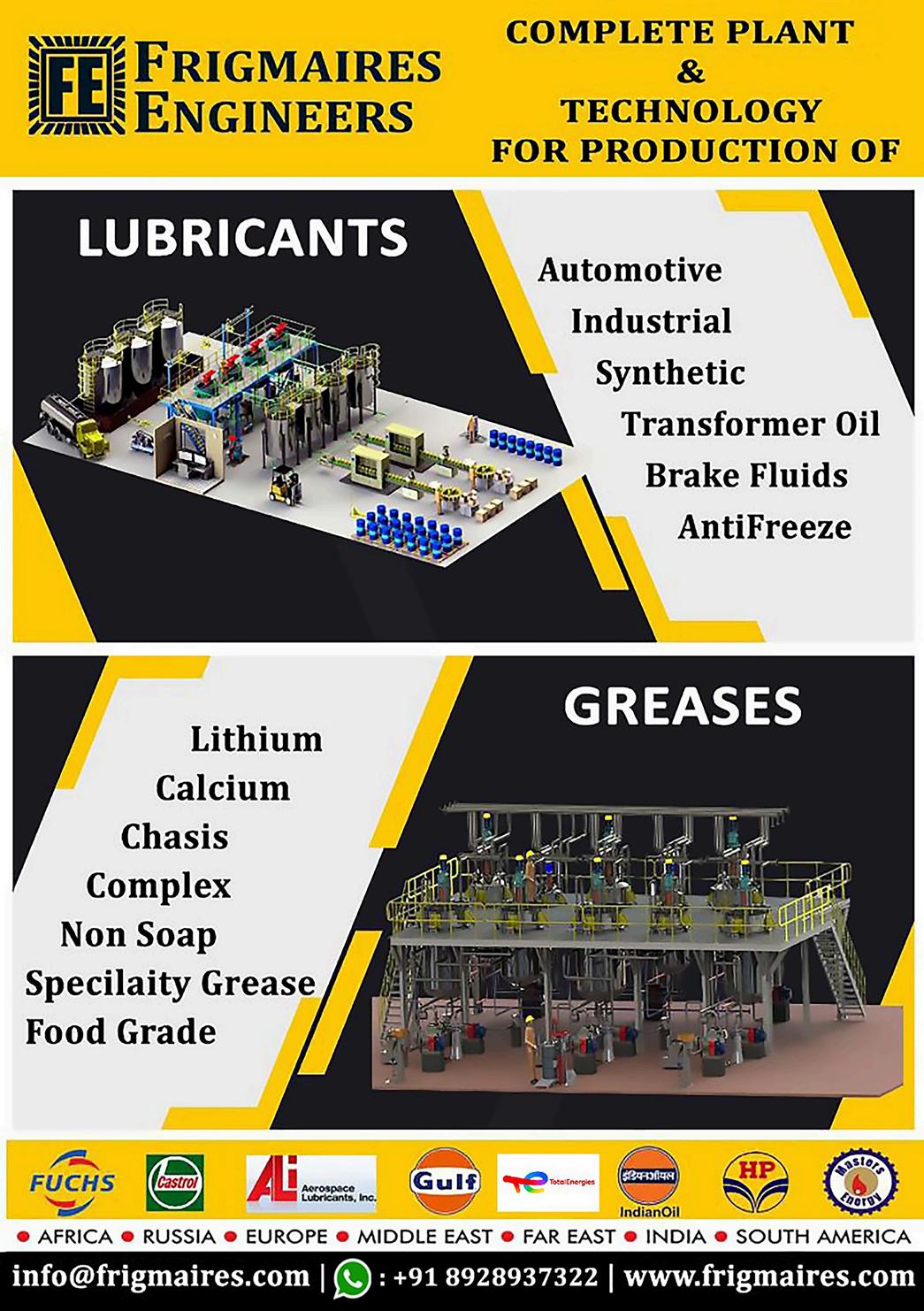
Castrol, a major lubricants producer and part of the BP Group, celebrated its 125th year anniversary.
Castrol will also use a special 125-year commemorative logo throughout 2024 in events and sponsorships worldwide.
On the 9th of March 1899, Sir Charles Wakefield founded CC Wakefield & Co. Limited; the company that became Castrol that is known today. The company started developing lubricants for automobiles and airplane engines. Currently, Castrol produces lubricants and greases that service the automotive, marine, industrial and energy sectors.
As the company celebrates its 125th year, Castrol unveils a new ‘Onward, Upward, Forward’ strategy to reflect the
future plans it has in terms of growing its lubricants business.
The new strategy encompasses the following three pillars:
• Onward: advancing mobility solutions that help people and goods move with greater efficiency through innovative technologies
and a commitment to the principles of circularity.
• Upward: helping Castrol’s industrial customers, and the machines they rely on, to perform better, improving the efficiency of their operations.
• Forward: exploring opportunities and a path of progressive diversifica-

tion. Castrol’s initiatives include end-to-end digital and service solutions, data centre immersion cooling, and battery thermal management.
Michelle Jou, CEO of Castrol concluded, “As we celebrate 125 years, Castrol is not just reflecting on the past but charting a course for the future. Our ‘Onward, Upward, Forward’ strategy embodies our dedication to accelerating our customers’ progress, helping them face the challenges of tomorrow. We aim to grow our core business in new ways, using our cutting-edge technology and our trusted global brand to stay at the forefront of our sector. .
PARTNERSHIP
Shell Lubricants and Ducati will co-design highperformance motorcycle engine oils for a further three years. Shell also continues to supply the oils to Ducati’s global dealer network as part of an extension of a collaboration established in 2020.
Shell will supply the co-branded Shell Advance Ducati engine oil and Ducati Corse Performance Oil powered by Shell Advance. The Ducati Corse Performance Oil was launched in 2023.
It will also supply engine oils for the first fill of all Ducati motorcycles produced at Ducati’s factories in Bologna (Italy) and Rayong (Thailand) and Shell Advance Ducati engine oil to the aftermarket through Ducati’s global dealer network.
Aysun Akik, Vice President of New Business Development and Global Key Accounts at Shell Lubricants, said: “The extension of our collaboration is a testament to the strength of our 25-year relationship with Ducati. It will see us continuing to use the learnings and innovations from the racetrack to deliver better road-going products for the benefit of Ducati and Shell customers around the world.”
Francesco Milicia, VP of Sales and After Sales Ducati Motor Holding, said: “Our company firmly believes in transferring knowledge and technologies from the world of racing competition to production motorcycles. The partnership with Shell, which has successfully been at our side for more than 20 years, also follows this approach. The
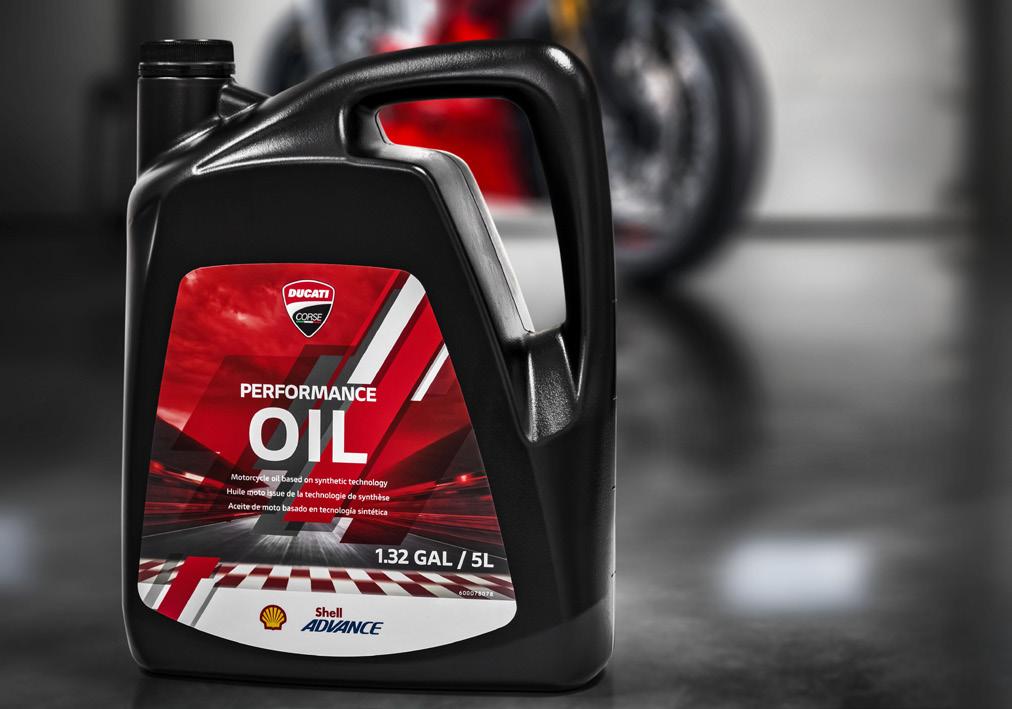
renewal of the agreement allows us to continue working together on increasingly high-performance products to enhance the performance of our motorcycles, as recently happened with the Ducati Corse Performance Oil Powered by
Shell Advance.” Shell has supported Ducati since 1999 when the manufacturer was racing in the WorldSBK Championship and since 2003 when it joined the MotoGP Championship. .

IMCD, a global leader in the distribution of speciality chemicals, recently held a conference for the lubricants sector in Nairobi, Kenya. This event was organised in collaboration with one of their key principals, Lubrizol, a leading producer of additives, and brought together lubricant blenders, marketers, and senior officials from both IMCD and Lubrizol. The primary aim was to educate the Kenyan market on the importance of quality additives and to introduce Lubrizol’s extensive product range available through IMCD.
The conference began with an overview of the African market and its anticipated growth rate. The increasing number of vehicles and flourishing industrial sector MARKET PENETRATION
The increasing number of vehicles and flourishing industrial sector are expected to drive continuous demand for lubricants in the African continent. New standards and efforts to ensure quality lubricants are in the market are also increasing the demand.
are expected to drive continuous demand for lubricants in the continent. Lubrizol highlighted the critical role of additives in lubricants, discussing various products tailored for the East African market, including additives for automotive and industrial lubricants, fuels, greases, and metalworking fluids, all distributed regionally by IMCD.
John Fitton, IMCD’s Business Group Director for the Middle East and Africa (MEA) for Lubricants and Energy, explained the motivation behind the conference. He cited the significant growth opportunities for the lubricants additive business in Africa, noting the market’s shift towards high-quality synthetic lubricants and the increasing awareness
of their impact on machinery. Fitton emphasised the region’s eagerness for knowledge and training, underscoring the need to educate end users about the advantages of using premium products over cheaper, low-quality alternatives.
Furthermore, Joseph Juma, Business Unit Manager for IMCD East Africa, stressed the importance of quality and performance when selecting additives. He expressed pride in offering Lubrizol’s product range and providing customers with the latest technologies and global trends in the lubricants industry.
IMCD has been expanding its presence in Africa since 2003, meeting the growing demand for lubricant additives. With
offices in Nairobi and South Africa, the company plans to further develop its business in the region. Over the past two decades, IMCD has focused on diversifying its product range, strengthening customer relationships, and providing technical support.
Joseph Juma expressed optimism about the growth potential of Africa’s lubricant additives market. “The lubricants additives market in Africa looks promising as, with new standards and efforts to ensure quality lubricants are in the market, the additives business is showing significant growth potential.”
Avinash Kamuni, Lubrizol’s Technology Deployment Manager for Engine Oils in
India, the Middle East, and Africa (IMEA) region, noted the surge in vehicle imports in Africa by a two-digit percentage, which increases the demand for lubricants and additives. He highlighted the need for lubricants meeting new low-sulfur specifications, which in turn boosts the demand for specific additives.
Lubrizol showcased key products for the East African market across the transportation and industrial sector. Sandeep Pawar, Lubrizol’s Product Manager for Small Engines & Passenger Car for IMEA Region, discussed the growth opportunities in the passenger car and small engines business segment, emphasizing the development of additives that meet various international specifications to simplify the selection process for oil marketers. “For the passenger car and small engines

business segment, there are growth opportunities, especially given the types of cars being imported to Africa with lubricant requirements that demand a higher technology. We are positioning ourselves to be able to take care of this need. Vehicles imported from different regions have different specifications, creating a complex scenario, so we are working on developing appropriate additives for this market. By doing this, we simplify the situation for oil marketers so they can choose additives that meet different specifications and applications.”
Kamuni further explained, “To avoid a blender having to buy different additives to meet various lubricant specifications, we have developed products, which meets different specifications from API CH-4 to API CI-4. Boosters can be added to the Lu-

Lubrizol is developing additives that meet various international specifications to simplify the selection process for oil marketers.
brizol primary additive to achieve different specifications., Lubrizol has products which can meet lubricant specifications, and are compatible with different base oils.”
Lubrizol has positioned itself to meet the dynamic market changes with a wide range of products. The heavy-duty segment has products that can meet specifications ranging from API CH-4 to API CK-4, and these additives have OEM approvals. With new industry standards developing across Africa and globally, OEMs are trying diverse ways of achieving more efficiency in the engines. One of the options the OEMs have found is the TurboCharger Gasoline Direct Injection (TGDI) system.
TGDI engines’ more severe operating conditions have an impact on the lubricant. Higher levels of oxidative and thermal stability are required to prevent premature breakdown of the oil while the engine runs. More importantly, TGDI engines are susceptible to a unique phenomenon known as Low-Speed Pre-Ignition (LSPI). LSPI events are random and infrequent, but can cause very high-pressure spikes, loud knocking noises and sometimes catastrophic engine damage. The good news is that modern engine oils formulated with the right performance characteristics can help prevent LSPI.
At the conference, Lubrizol announced its efforts to manufacture additives specifically for the African continent. Fitton highlighted IMCD’s long-standing commitment to delivering quality products since 2003, working closely with Lubrizol to create products tailored to the continent’s unique needs.
Lubrizol additives have been well-received in East Africa since 2018. Juma praised the positive reception and IMCD’s role in supplying a wide range of specialty
additives, adding significant value to local and independent blenders. “Lubrizol additives in East Africa have been positively received because IMCD supplies a range of these products, including specialty additives that blenders might use only a drum or two within a year. We are a source of additives for local and independent blenders. We are a value-adding company to our customers, and we are proud to partner with leading manufacturing Lubrizol, offering high quality products to our customers in East Africa.”
IMCD not only offers Lubrizol additives to the market; it provides extensive technical support, including data, samples, testing services, product marketing, and supply chain support. By understanding and reacting to challenges in the global supply chain, IMCD ensures customers have access to the products they need.
“For our product distribution, we are very flexible in accommodating customers. We have the stock locally available for the blenders who might need one or two drums of additives, and for clients who might require container loads, we can have the products directly shipped to them. The supply chain is critical for us, and we constantly work with our customers to ensure we can react to their specific needs.” said Joseph Juma.
Sandeep Pawar added, “Having direct presence in South Africa, has helped Lubrizol make in-roads in the African market, ensuring the products’ quality and supply. We also have a great salesforce, and our distribution partners, IMCD, are helping expand our footprint on the continent.”
The business model IMCD adopts in Africa is a distribution model, where it represents its principals and distributes directly to the end users who are the lubricant manufacturers.
In addition to the lubricant additives, IMCD offers complementary products, such as fuel additives, coolants, raw materials to make grease thickeners, dyes, Group IV (PAOs) and Group V and specialty products for the mining segment.
IMCD is committed developing its Lubricants and Energy business throughout the Africa region. Accelerating Progress for the future of the Lubricants and Energy Business. .
In this edition, we are joined by Ajay Pandey, the Director and Global Head of lubricants at Delta Group, a seasoned professional in the lubricants industry with 30 years of experience. Mr. Pandey gives us deep insights about Nigeria’s lubricants market where he has been working for the last 15 years.
Could you take us through your journey in the lubricants industry?
I started my career in the industry in 1994 when I joined Elf Lubricants, a French multinational company that was setting up operations in India. I was part of the team that rolled out Elf lubricants in the Indian market, and in the next 10-15 years, Elf became a major lubricant brand in India after Castrol. In 2000, Total acquired Elf Lubricants, and the company later became Total India.
Between 2002 and 2005, I oversaw the lubricants business in Northern India. In this capacity, I also sold the Total and Elf brands of lubricants. I left in 2005 and joined Reliance Industries as the General Manager for the northern region of India. My team and I launched a lubricant brand for Reliance and rolled out the Relstar brand in Indian market.
When did you get involved in the African Lubricants business?
I left Reliance in 2009 and joined Conoil Plc in Lagos, Nigeria. I was the head of the lubricants business and stayed for four years. At Conoil, I helped launch Okada Golden Super, a lubricant for motorcycles and tricycles. I also launched other specialized oils for the generator and gas segments, and those brands are doing well in the market.
In 2013, after leaving Conoil Plc, I joined Masters Energy Group as Group Chief Operating Officer, in charge of developing several business segments for the company which include Oil & Gas, Lubricants, FMCG, Plastics, Shipping, Rice trading, Tricycle and Logistics. I left Masters Energy Group in 2017 and rejoined Conoil Plc as a Managing Director, stayed for over a year, and then joined Gulf Petrochem (GP). GP had just bought a blending plant in Nigeria and was setting up another one in Tanzania, so I came on board to oversee the business.
Hi-Speed Lubricant was GP’s first brand in Africa because it took over the assets of Hi-Speed Lubricant and bought the brand, too. We re-launched the Hi-Speed lubricants brand in the Nigerian market in late 2020 and changed its look and feel. In 2022, GP’s African assets were up for sale, and it was bought by Delta Corp, which I currently work for.
What is the scope of your responsibilities as the Director and Global Head of lubricants at Delta Group?
I look after all the lubricants business in Africa, and I am also responsible for setting up the lubricants business worldwide. We plan to be present in more than 10 countries in Africa by end of 2024 and further expand to UAE and Indian subcontinent by 2025. We are also positioning Delta as a one stop solution for toll

Nigeria and Tanzania.
Delta Group has the Hi-Speed lubricants brand; what market segments do you serve, and how have these products been received?
Hi-Speed lubricants are primarily more popular in the Business-to-Customer (B2C) segment, and we cater to 2-wheelers, 3-wheelers, the vehicle segment, the truck segment, the generator segment, and the hydraulic segment. We also have a specialized range of lubricants under the Delta brand, focusing on the Business-toBusiness (B2B) segment. We are therefore covering the automotive and the industrial segments. Some of the industries we serve are steel, construction, plastic manufacturing, FMCG, Mining, Sugar, Cement and logistics industry.
As for the reception of the products, we have repositioned Hi-Speed as a high-premium lubricant brand of high quality, and the market has positively received it.
Apart from Nigeria, Delta Group operates in which other African countries, and what are the similarities and differences in these markets?
We are present in six African countries: Nigeria, Tanzania, Kenya, Uganda, Rwanda and Zambia. We have blending plants in Nigeria and Tanzania. In Kenya, our subsidiary is DC (Delta Corp) Energy. We have a more significant presence in Uganda in the fuel business. We also have a distributor partnership with ADNOC in Rwanda and Zambia and hope to start selling Hi-Speed lubricants in Rwanda soon. We also plan to sell Hi-Speed in Mozambique and increase presence in East Africa.
I have seen differences between the West African market, where I am based, and East Africa. In West Africa, companies do cash sales with no credit, but the East African market is credit-driven, and companies give credit to sell. Consequently, in Nigeria, bad debt is low due to the no-credit policy to distributors, while in East Africa, bad debt is high.
These countries are similar in that they are growing markets with great potential. Both the markets, premium brands are growing at a faster rate with improved customer awareness. With better Industrialization, demand for Industrial & specialties lubricants are increasing.
Nigeria has multinational and local lubricant companies. What has helped Delta Group gain market share and cement its position as a significant regional player?
The first thing we have done with Hi-Speed lubricant is repositioning it as a premium-level brand, which means our price positioning is slightly lower than what the multinationals in Nigeria sell their lubricants at. Still, it is also higher than the price of local lubricant brands. We also conduct training in the market so that people understand that the quality of our lubricants is very close to that of multinational brands, but our lubricants are more affordable. This has helped us solidify our position as a quality brand.
You have extensive knowledge about Nigeria’s lubricants market. What changes have you witnessed over the years, and what changes do you foresee happening in the future?
Having worked in the Nigerian lubes industry for about 15 years, I noticed that when I started, the industry was largely unorganized; many recycled products were imported, and substandard goods were sold. The duty of imported base oils and finished lubricants was the same. Hence, there wasn’t much growth in the local lubricants industry. The Lubricant Producers Association of Nigeria (LUPAN) came into action and worked hard to ensure the duty was revised. Currently, the duty for importing finished lubricants is 30%, and for base oil, it is 5%.
I also observed that the products being sold in the market had very low specifications or no specifications at all. However, the government has worked to get rid of these oils from the market. Previously, about 50% of the lubricants business came from the unorganized sector, which has reduced to 35%, and now currently, 65% comes from the organized sector.
Lubricants professional bodies like MOMAN and LUPAN are important because they can talk to higher authorities on behalf of the market players on matters like policies governing the industry.
8
Nigeria has a significant backup power generation segment. Do you think this segment will grow or diminish if the grid power distribution becomes more reliable?
The segment is divided into two parts: organized and unorganized. The organized side has players like Caterpillar, Wartsila, and Cummins, who require specific lubricants from multinational companies to be used in their generators, so they are more OEM-specific and more established in B2B business. There is a shift towards the use of gas, and the government has been pushing for the use of this in industries; hence, the gas engine oil business is growing. This segment’s second part is B2C, which is mainly unorganized and deals with small household generators. These generators are powered by petrol. This business will start shrinking as there is an increased uptake in solar and the use of gas.
Over the years, the industries have also grown and increased in number, and consequently, the B2B business is also growing. The primary power source in Nigeria has been generators, but some of the things we are seeing start to happen are efforts to revive the power grid and plans to bring back the rail. This will mean increased lubricant business in the areas of power generation and rail. 9
What are some of the challenges in Nigeria’s lubricants market?
One of the significant challenges is that the logistics aspect of the business is expensive, and it eats into the profit margins for most traders. Another difficulty is the awareness of the importance of using good quality lubricants, which needs to increase among customers in Nigeria. The Oil Marketing Companies (OMCs) have a role in raising this awareness. Also, organizations like The Standards Organization of Nigeria (SON) and LUPAN need to be stricter in ensuring better products are sold in the country while protecting the interests of local players. There are also a lot of loopholes in the policy governing the lubricants industry, and it would be better for SON to seal them. This includes implementing better policies to discourage the importation of recycled oils into the market.
Looking at Nigeria’s lubricants segment, professional bodies like MOMAN and LUPAN exist. What would you say are their contributions to the lubes market, and can they be strengthened? Would you also recommend that other African countries form such bodies?
Having such bodies in every country is important because they can talk to higher authorities on behalf of the market players on matters like policies governing the lubricant industry and duties on products like base oils. Since these bodies have many members, the individual interests of companies take a back seat, while the common interest in terms of the long-term goals for improving the industry in the country takes the lead. .

Nigeria is one of the major lubricant consumers in Africa, with a population of 223.8 million people as of 2023. Mordor Intelligence predicts that the Nigeria lubricants market size is estimated to be 553.40 million Liters in 2024 and it is expected to reach 597.33 million Liters by 2026, growing at a CAGR of 3.89% between 2024 and 2026.
While the automotive industry is the largest lubricant user, power generation is becoming the fastest-growing segment due to the increasing use of natural gas and wind turbines for energy generation. To cater to the existing and growing demand for lubricants, the Nigerian market has many brands, ranging from interna-
Tethys Ltd is the exclusive brand licensee in Nigeria for Texaco lubricants produced by Chevron.
tional, regional, and local brands, that are working towards supplying lubricants.
The international brands present take the bigger share of the market, but regional and local companies have also cemented their position in the market and gained a customer base. For some international brands that don’t have subsidiaries in Ni-
geria or joint ventures with companies in the country, most of them use regional and local companies as their sole and official distributors to penetrate the market. Such arrangements have been crucial in assisting most international brands to establish themselves in African markets. Such partnerships are a win-win situation for both companies as they complement and leverage each other’s strengths. For the local company, there is the strength of market knowledge and ease of penetration. For international brands, there are more resources and access to the latest technologies and high-quality products in the lubricants market, which makes it possible to gain clients in the African landscape.

Tethys Limited is one of such local companies that has carved out a place for itself in the Nigerian market. It is also the Brand Licensee of a major international lubricants brand.
Started in June 2020, Tethys Ltd is an indigenous sales and marketing company with a vision to establish itself as a dependable player in the downstream energy sector. Tethys aims to create a strong presence in the market, driven by a passion for continuous improvement, ethical business practices, and a deep understanding of its customers’ needs.
Tethys is the exclusive brand licensee in Nigeria for one of the major lubricant brands globally: Texaco lubricants produced by Chevron. This partnership allows Tethys to import, locally produce, market, and distribute Texaco-branded lubricants. Through this strategic collaboration, lubricants consumers in Nigeria, ranging from motorists to industries, now have access to a wide range of locally blended Texaco automotive and industrial lubricants under the Texaco, Havoline®, and Delo® brands. Some lubricants available include
engine oils, transmission fluids, gear oils, greases, and hydraulic fluids.
The market segments served by Tethys with Texaco Lubricants are the Consumer, Commercial, and Industrial Markets. The Consumer Market comprises retail station outlets, lube kiosks, and lube bays. The commercial market includes distributors and resellers. The industrial market includes sectors like manufacturing, construction, oil and gas, and power generation, among others.
To ensure the quality of Texaco lubricants blended in Nigeria matches what Chevron blends, Tethys sources its base oils from local suppliers who import from refineries approved by Chevron. For the additives, they use Chevron Oronite’s additives from France.
Tethys currently operates and markets Texaco lubricants in Nigeria, and this market has its fair share of opportunities and challenges. The Nigerian lubricants industry presents opportunities such as a growing automotive sector, increasing industrialization, and with a large population, it translates into an increased demand for
lubricants. Opportunities also abound in marine, agriculture, mining, and power generation industries.
Importing raw materials like base oils and additives for the Nigerian lubricants industry can present several setbacks, including exchange rate fluctuations, supply chain disruptions, tariffs/duties, and regulatory and compliance complexities. Other challenges include competition from multinational companies and infrastructural limitations.
Despite the obstacles in the market, it is encouraging to see indigenous companies like Tethys coming into play to cater to the market needs and position themselves as a trusted entity to be chosen as a Brand Licensee to a major brand. As the African continent continues to grow and as the demand for lubricants increases, it will be interesting to see local companies’ role in taking care of the market needs. Tethys is leading by example that these indigenous companies are the backbones of driving lubricant businesses in their respective countries. .
workplace safety One drive for all LC sizes
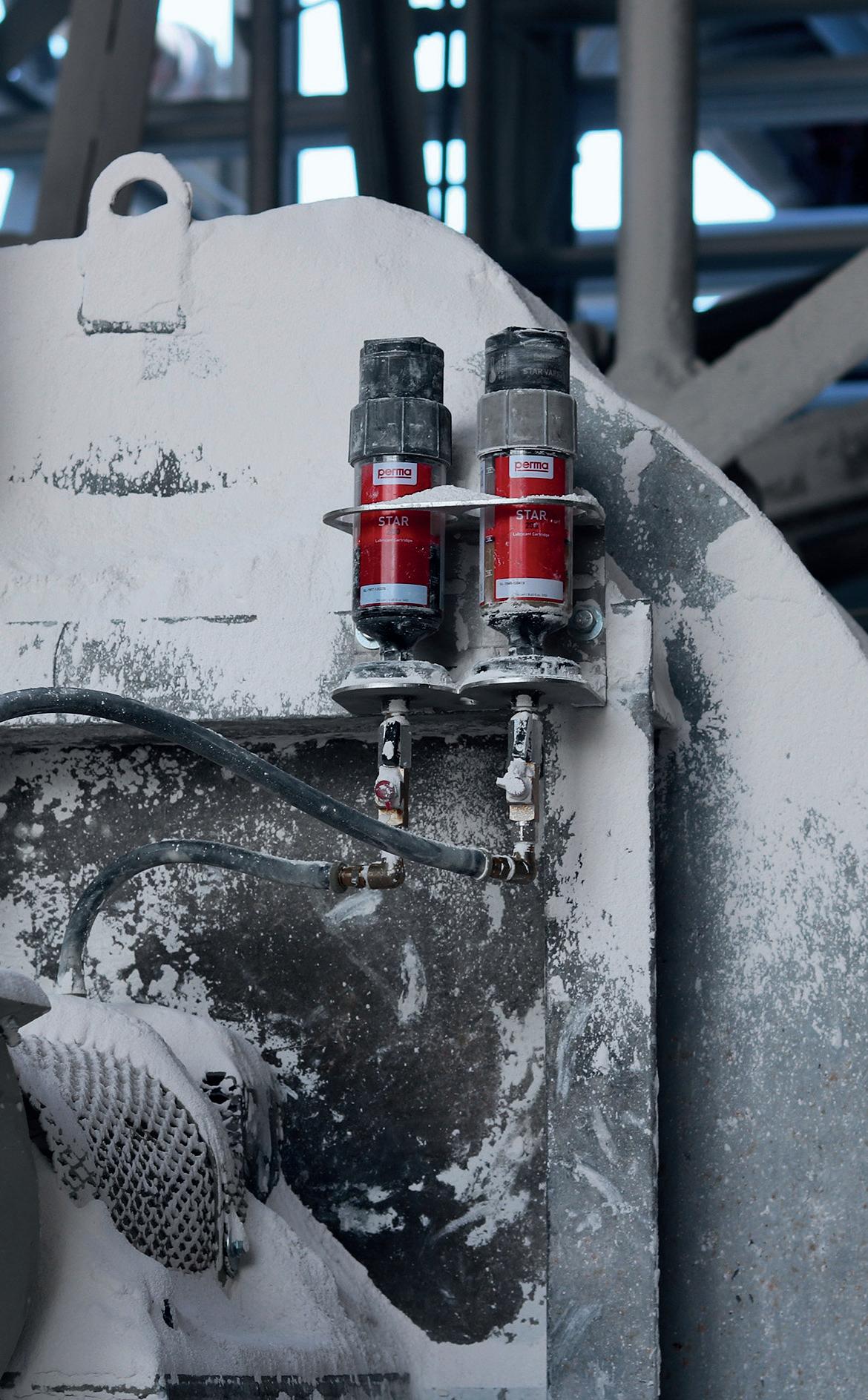
Drive – reusable
Electromechanical function with Battery pack STAR VARIO (Alkaline) or with Battery pack STAR VARIO low temperature (Lithium)
Discharge period 1, 2, 3 ... 12 months | 1, 2, 3 ... 52 weeks
STAR LC 60: + 15, 18, 21, 24 months STAR LC 500: max. 6 months
Lubricant volume 60, 120, 250, 500 cm3 | 2.03, 4.06, 8.45, 16.91 oz
& special lubricants Greases up to NLGI 2 | Oils
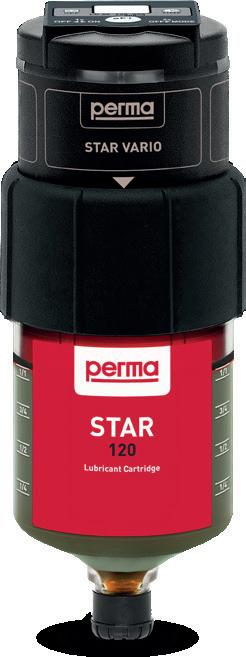

By Mohamed Baraka, the Managing Director of Synergy Lubricants
The lubricant industry is very critical for the development of any economy. In modern life, lubricants are required, and the more sophisticated the equipment is, the more it demands a high-quality lubricant. It is usually said that “The lubricant is the blood of the economy.” If pure and applied correctly, it will propel the economy to prosperity. If it is of low quality, its effects are detrimental to the equipment and the economy.

The double-edged sword of substandard and counterfeit lubricants is a challenge that bedevils the Kenyan lubricants industry. In this article, we delve deep into the challenges that are crippling the lubricants industry in Kenya and highlight a small fraction of the amount of revenue lost in this industry due to these challenges.
A good-quality base oil is made by fractional distillation of crude oil, and distillation products are very pure. A good-quality lubricant must use virgin base oil obtained by fractional distillation and blended with chemical additives whose performance has been tested in the intended equipment. A high-quality lubricant must also be made in a quality blending plant with
Recycled base oils provide the feedstock for the production of counterfeit lubricants, which not only deny quality lube brand owners revenue but also damage machinery.
a well-calibrated laboratory. Both blending and testing must be manned by qualified and experienced staff. The process that guarantees quality must be managed
through written procedures.
The country is seeing an increase in the use of recycled base oils. These base oils are produced in a simple process of filtration and decantation to remove solid contaminants in the used oil, and the resulting oil looks very much like virgin base oil. As this process is simple, the base oil obtained costs almost half the price of virgin base oil. This is the main ingredient in the substandard lubricants. These base oils are blended, repacked, and sold to unsuspecting users. In many cases, no additives are used, but even if they were used, they wouldn’t be effective as such additives might not be compatible with the contaminants in the recycled base oil.
These oils can easily damage machinery. They contain glycols from brake fluid and

coolants, which catalyze them to thicken in service, especially since the antioxidant additives in the original oil are exhausted.
Additionally, recycled base oils provide the feedstock for the production of counterfeit lubricants, which not only deny quality lube brand owners revenue but also damage machinery.
There is an existing standard in Kenya that prohibits the importation of recycled base oils, and it requires pre-shipment inspection, which means that the oil is tested at the source. When this was implemented, the importation of recycled base oils was drastically reduced. However, after some time, importers were given the option of destination inspection. This brought the challenge of THE Kenya Bureau of Standards (KEBS) being overwhelmed with all the testing they had to do, and consequently, some substandard goods slipped through the cracks and found their way into the Kenyan market. This has caused massive importation of recycled base oils in the country with a corresponding increase in counterfeit and damage to equipment.
To spur growth in the local manufacturing sector, the Kenyan government granted lubricant blenders the duty-free importation of base oil under the Duty Remission Scheme (DRS). While this was supposed to spur local manufacturing, create employment, reduce lubricant importation, make quality lubricants affordable to most users, and create wealth through ex-
It is reckoned that the Kenyan economy could be losing over $4 billion per year through lubricant misapplication. This is about ten times the cost of lubricants used in Kenya annually.
ports, it has now created a loophole where blending facilities that are not to the standard are also given duty remissions and are importing recycled base oils while others are importing finished lubricants, which are declared as base oils.
Some of the finished lubricants imported under this disguise come packaged, so the benefit expected to be reaped by local package manufacturers has gone to zero, not to mention that employment in the industry is decreasing instead of increasing.
Through the DRS, there is a high likelihood that counterfeiting will increase tremendously as the volume being imported under DRS cannot all be sold in the importer’s brand. Most of it will be used for counterfeiting, and the level of coun-
terfeiting is now at a magnitude never witnessed before. The exports might also be counterfeited, which has the potential of further ruining Kenya’s image in the export market and killing the little remaining export business.
The proliferation of calcium greases in the market is still a concern. A critical aspect of grease is its dropping point (melting point). Grease is base oil plus additives and thickener; the thickening material determines the melting point. Traditionally, greases used in chariots were animal fat plus calcium compounds. Calcium greases were used until the mid-1950s. They could not sustain the high temperatures generated by more advanced equipment because they have a dropping point of 100ºC and can be operated up to 60ºC, which is very low.
Relief came when lithium greases were discovered, catalyzing high-performing vehicles and machinery development. By the late 1960s, calcium greases were discontinued. About 30 years ago, calcium greases were banned in Kenya by introducing a grease standard that set the minimum dropping point of 160ºC. Sadly, calcium greases are still in the market; some have dropping points of as low as 90ºC. These greases require frequent re-greasing; if not done, the bearings fail and need replacement. Frequent re-greasing means more environmental damage, and we are equally wasting billions of shillings importing bearings to replace those that frequently fail.
Another major challenge in the market is fake or substandard radiator coolant. Using a basic rust and corrosion test, these coolants can be shown to be nothing more than water to which an appropriate dye has been added. Because they lack the necessary corrosion inhibitor additives, they damage the cooling system through rust and corrosion. Others even precipitate and clog the cooling ducts, resulting in overheating and engine damage. Kenya spends a lot of its hard-earned forex to import cooling system repair parts that could have been prevented by using quality coolants.
It is reckoned that the Kenyan economy could be losing over $4 billion per year through lubricant misapplication brought about by the challenges highlighted above. This is about ten times the cost of lubricants used in Kenya annually. .
